
Project Gutenberg's Five Minutes' Stories, by Mrs. (Mary Louisa) Molesworth This eBook is for the use of anyone anywhere at no cost and with almost no restrictions whatsoever. You may copy it, give it away or re-use it under the terms of the Project Gutenberg License included with this eBook or online at www.gutenberg.org Title: Five Minutes' Stories Author: Mrs. (Mary Louisa) Molesworth Illustrator: W. J. Morgan Release Date: July 18, 2010 [EBook #33196] Language: English Character set encoding: ISO-8859-1 *** START OF THIS PROJECT GUTENBERG EBOOK FIVE MINUTES' STORIES *** Produced by Delphine Lettau, Clive Pickton and the Online Distributed Proofreading Canada Team at http://www.pgdpcanada.net

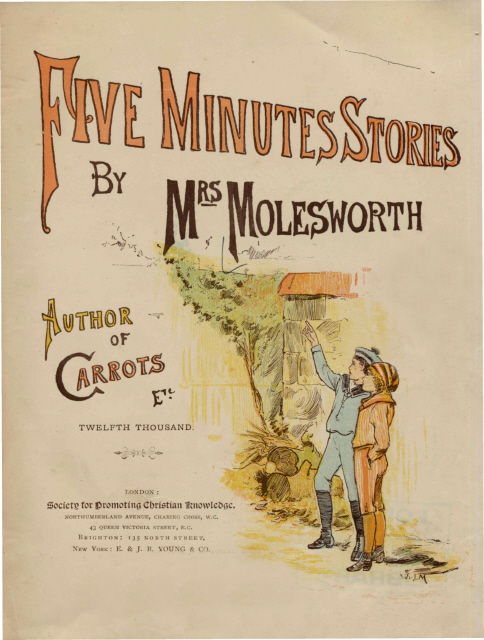
London:
Society for Promoting Christian Knowledge.
NORTHUMBERLAND AVENUE, CHARING CROSS, W.C.
43 QUEEN VICTORIA STREET, E.C.
Brighton: 135 NORTH STREET.
New York: E. & J. B. YOUNG & CO.
Richard Clay and Sons, Limited,
London and Bungay.
[Pg 4]
| page | |
| Abdallah the Unhappy | 9 |
| Fifine and her Cat | 14 |
| The Long Ladder | 19 |
| A Four-Footed Gentleman | 24 |
| The Bad Fairy | 29 |
| The Goblin Face | 35 |
| The Lost Brooch | 41 |
| Only a Bunch of Violets | 48 |
| A Canary Tragedy | 54 |
| Coo-Coo's Second Husband | 61 |
| Harry's Reward | 67 |
| Brothers and Mushrooms | 73 |
| A Remarkable Watch | 81 |
| The Blackberry Elf | 88 |



GREAT many years ago there dwelt in a city of the East, of which you have never heard the name, a wise and holy man. He was highly esteemed by his fellow citizens, for he was kind and benevolent, never refusing good counsel to those in earnest to profit by it, so that by degrees the fame of his sagacity spread far and wide, and many came from great distances to consult him.
One day he was sitting in front of his modest dwelling, enjoying the soft breeze that stirred the trees hard by, reading from time to time[Pg 10] short passages of an ancient volume open upon his knees, when a shadow fell across its pages, and looking up, he perceived that a stranger stood before him, who saluted him with the greatest respect and courtesy. The sage returned the customary greetings, and then inquired in what he could be of service to the new-comer.
"Father," said the stranger, "I have journeyed far to ask your advice. My quest is summed up in few words, What can I do to be happy?"

The wise man looked at him searchingly. He was a handsome man in the prime of life, richly dressed, healthy and vigorous. His appearance would have been most prepossessing but for a melancholy and discontented expression of countenance—there was no genial smile about the mouth, no kindly light in the eyes.
"What have you tried?" inquired the sage.
"Everything," replied the stranger. "Yet without foolish prodigality and excess. I have sought to surround myself with beauty and refinement, for my wealth is inexhaustible. I have dipped deep into learning, for my abilities are, I am told, considerable; I have even of late in a sort of despair tried to find content in enjoyment of less elevated kinds, such as seems to satisfy many men. But all was useless—eating and drinking, and such physical gratifications could do nothing for one who had sought in vain satisfaction in the perfection of music, of painting and sculpture—nay, more, who[Pg 11] had found in the severest of studies but weariness and disappointment."
"You have been too changeable and impatient, my son," said the sage. "Try again—I do not say return to the lower pleasures of which you speak, but devote yourself more exclusively to the fine arts. Travel far and wide and visit whatever is beautiful. One year from now, return, and tell me the result."
Abdallah bowed and departed. The year passed, and again he stood before the sage, despondent as formerly.[Pg 12]

"In vain. I have exhausted myself in travel. I have seen all the world has to show. I am more miserable than ever."
"Turn then again to study. Shut yourself up with your books. Work your hardest and see if therein you cannot find contentment. If you succeed I shall not expect to see you again."
But some days before the year had elapsed, there once more stood Abdallah. He had grown thin and pale, his eyes told of midnight vigils, but their expression was no happier.
"It is useless," he said. "I have followed your advice. But I am not as other men. Nothing brings happiness to me. There is but one thing to do, but first I would ask your permission. Let me make an end of myself."
The sage frowned.

"It must be as you say," he replied after some moments' silence. "You are perhaps so constituted that happiness is impossible for you. If so, resignation is all that remains. But I cannot at once sanction your desire to quit this life. I must reflect upon it during a year. In the meantime consider the struggle as given up; think no more of your unhappy fate, but as you are about to die, use the time that remains, to some purpose, by spending it for others. You are the one wretched exception—so be it. Spend your time,[Pg 13] your strength and your wealth in making some others—ordinary human beings—happier, so that at least some few tears may be dropped on your grave. Return in a year, and I will then authorize you to put an end to yourself."
And Abdallah again bowed and withdrew, somewhat consoled by the thought that one year would see the last of his wretched existence, that even the wisest of men recognised him as cut off from the common lot.
The year passed. But no Abdallah returned. It was not till some weeks after the appointed time that he appeared hastening eagerly towards the sage's dwelling. He was no longer thin or pale, his dress was much less rich than formerly, but seemed nevertheless to show his handsome figure to all the greater advantage, his bearing was upright, his step springing—there was a smile on his lips, a beautiful, kindly light in his dark eyes.
"Forgive me, father, for my delay," he cried. "I could not believe the time had passed. This year has seemed to fly."
"And you are ready to part with your life?" asked the sage.
Tears rushed to Abdallah's eyes.
"If the sacrifice could be of use to others, yes, father, I am ready," he replied. "But for myself, no, a thousand times no. I have found the secret of happiness. In ministering to others, in forgetfulness of self, I have found my own blessedness. Life is to me now the most precious of gifts—my wealth, my strength, nay the very learning, the very cultivation I found so disappointing when unshared, I now esteem most highly as increasing my capacities for doing good. Life is beautiful—O good father, let me live."
And the wise man lifting his hands in benediction on the head of the happy Abdallah, bade him go in peace, having entered upon the one only path of endless and eternal blessedness.[Pg 14]
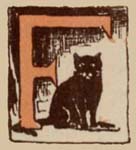
IFINE was walking quietly up and down the garden path, her big cat, Mimi, in her arms. From time to time she talked to Mimi, asking her questions or telling her the thoughts passing through her mind, and when Mimi purred, Fifine was quite satisfied that the cat was agreeing with her. When she did not purr, and gave no signs of attending, Fifine would give her a little shake, or even a pinch, which naturally made Mimi squeak, and was supposed to mean she was not this time of the same opinion as Fifine. This had happened more than usual this morning, for Fifine was in a rather irritable humour. She was not feeling pleased with herself, and nothing makes little girls, and big people, too, more uncomfortable than this.
Suddenly, from a little distance came a well-known voice.

"Fifine, my child," it said, "you have not come to the little gate to wish me good morning," and looking up, Fifine saw a tall[Pg 15] figure, all dressed in black, standing some way down the path. It was her kind friend and neighbour, the old curé or village clergyman, whose house was at the other side of the high garden wall. In general Fifine was delighted to see him, but this morning she walked towards him slowly, making a sort of pretence that Mimi was too heavy for her.
"Where is Madeleine?" said the clergyman, his voice sounding grave. Madeleine was Fifine's sister, and two years older. "She is not ill? Why is she not with you?"
"She—she is in the house," she replied. She had glanced up for a moment in his face, but the serious look in his eyes, generally so kind and gentle, made her quickly turn hers down again.
"You will not tell me why she is not playing with you as usual, I see," he went on very gravely. "Shall I tell you? It is because her little sister got into a passion with her, really for no reason at all. Would one believe it—this little sister slapped and knocked Madeleine, and called her many naughty names? No wonder Madeleine stays in the house."
Fifine forgot her shame in astonishment. She stared up in the old gentleman's face, both her eyes and her mouth wide open.
"How do you know?" she exclaimed. "We were in the house—in our own room. No one was there, and I know, sir, Madeleine has not seen you this morning; besides," and here Fifine looked down again, "Madeleine would not tell."
"No, you are right, Madeleine would not tell, and did not tell. A little bird told me, my poor Fifine, and it was sad news for him to carry this lovely morning," and shaking his head, the curé turned and walked slowly away.
"A little bird indeed," repeated five years old Fifine to herself contemptuously. "That is what they tell babies. I know better. A little[Pg 16] bird only means 'somebody' told. Besides, there are no nests on that side of the house. Who could it be? Mimi, tell me, don't be stupid now. Who do you think it was?" and as Mimi made no reply, Fifine shook her, which drew forth a plaintive squeak and a struggle to get out of her mistress's arms. This made Fifine still more angry. She flung Mimi down, the poor cat—for a worm will turn—glowered up at her, with a rather ugly look in her green eyes, and slunk off.
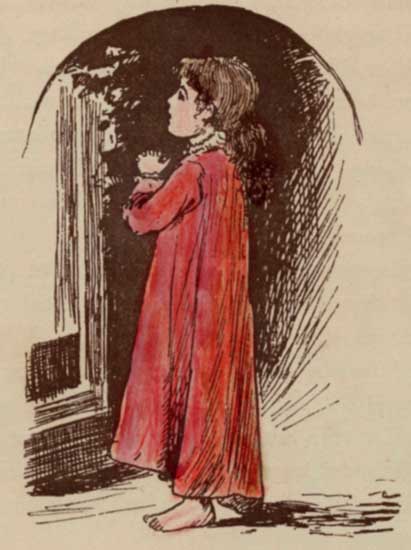
"I have it," exclaimed Fifine. "You nasty, mean, spiteful cat. It was you who told. I remember you were on the window-sill, and then I didn't see you any more, till I found you out here in the garden coming back from your visit next door, no doubt! Ah, you may pretend it wasn't you. You can't speak, but you can tell things all the same,[Pg 17] and Monsieur le curé is clever enough to understand. Why, he has often told me he can understand what his old dog Platon says by the way he wags his tail. You, too, were the only person who saw me hit Madeleine. Mean cat; but I shall punish you," and off dashed the indignant Fifine in pursuit of Mimi.
The summer day passed quickly. Sweet-tempered Madeleine soon forgot the offence she was only too ready to forgive, and in merry play with some little friends, the troubles of the morning were quickly out of mind. Tired with fun and excitement, Fifine fell asleep the moment her head touched the pillow. She had slept several hours when she suddenly woke. It was quite dark—the very middle of the summer night—at first not a sound broke the silence. Then faintly, but distinctly, came through the half-opened window a low piteous wail—again and again. Fifine sat up to listen. There was no sound from the larger room next door, where Madeleine slept beside the nurse. No one was awake but Fifine, and again, and again came that pitiful mew. Yes, it was a mew, and up jumped Fifine at last.
The curé had sat up late that evening, reading, his window open to the pleasant night-air. He closed his book at last, and was turning to put out the lamp, when a little sound made him look round. There, at the low window, stood a little white-robed, bare-footed figure, sobbing bitterly.
"Oh, sir, oh, sir, come and let Mimi out. I shut her into the tool-house, because I thought she had told you about my hitting Madeleine, and I can't get her out, and she will die of hunger—my poor Mimi—since yesterday morning she has had nothing to eat, and nobody is awake but you. I have come all alone in the dark. I forgot all about her," and the sobs redoubled.
In five minutes the kind curé had managed to open the door which the gardener had locked, and Mimi was safe in Fifine's arms.[Pg 18]
"And suppose it was not Mimi who told me?" said the good old man as he carried the little girl home again.
"I was naughty, but I didn't mean to leave Mimi all day. You said it was a little bird, sir, but I know that is only baby-talk."
"Yes, my child, and I am sorry I did not tell you who it really was. It was your dear mamma, my Fifine, who overheard your fit of temper and asked me to speak to you seriously. Will this be a lesson to you? See what angry temper leads to—hurting your sister, and nearly killing your poor cat."
"Forgive me, I will try to be better; indeed I will," sobbed Fifine.
"And ask God to help you, my dear little girl," said the kind curé, as he bade her good-night.[Pg 19]

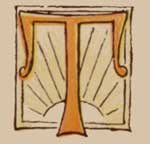
HE sun had set, and the deep blue darkness of a summer night was creeping over the sky. One by one the stars came out, and little Max stood by the window gazing up at them in admiration. He had never before seen so many, for it was long past his usual bed-time, and he had been allowed to sit up late for a great treat, as it was his birthday. Inside the room his mother was reading by a little table on which stood a lamp, but the curtains were drawn across the windows, and Max had crept behind them, so that the bright light inside did not prevent his seeing the infinitely brighter ones, that up there, millions and millions of miles away, came sparkling out one after the other, as if the sky lamp-lighter were slowly going his errands. Max felt as if he could stand there for ever, watching. But there came the summons.[Pg 20]
"Max, my boy. You must go to bed now."
"Yes, mamma," and the small figure crept out and held up its face for a good-night kiss. Then "mamma," he began, hesitatingly.
"Well, Max," and mamma raised her eyes again for a moment from her book. It was a very interesting book, and mamma had had her little boy with her all day, and had done her best to make him happy. Perhaps she was a little tired, and felt that she had earned some rest for herself.
"Mamma, is it God that puts them all there?" he asked. "All the little stars?" and he pointed towards the window.
"Yes, dear. You know it is. It is God that does everything good and pretty and kind—up there and down here too."
"Him makes the flowers in the garden," observed Max.
"Yes, dear, you know He does," answered mamma, her eyes turning back to her book again. "Good-night, Maxie."
"Good-night, mamma. But mamma—"
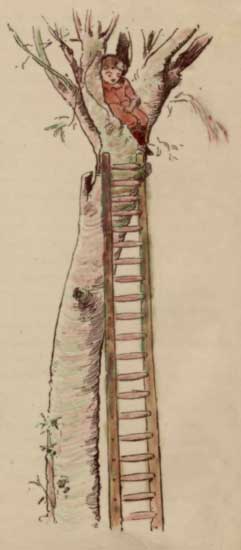
"Well, dear," without looking up this time.
"I was just thinking, when Him's done down here, you know, and wants to go up there again, what a very long ladder Him must need."
"Yes, of course," said mamma, quite lost in her story by now.
"I wonder," continued Max, "I wonder if Him ever leaves it in the garden after Him's gone up—after Him has been doing the flowers, you know, mamma."
"I daresay—yes, very likely. Now do go, Max."
"Does you really think so, mamma?" and Max's eyes, which had begun to look as if the dustman had been passing by, grew bright and eager again. "I'll look and see if I can't find it then, some day," he said to himself, as he climbed up-stairs. For Max felt sure that whatever[Pg 21] mamma said must be true. And wonderful dreams came to the little four-year-old man that night—dreams compared with which, all that Jack found at the top of his famous bean-stalk would have seemed nothing.
The next morning brought unlooked-for disappointment to the little fellow, for it was rainy and stormy. No going out for Max—he must stay quietly in the nursery. And he looked so very sad about it that mamma was a little surprised: he was usually so cheerful and contented.
"You had plenty of running about yesterday, Maxie," she said. "We cannot expect it always to be fine. To-morrow will be sunny again very likely," and at this Max brightened up again.
"Him will bring the ladder then, perhaps," he said to himself.
Mamma proved a true prophet, "To-morrow" was a lovely day. So lovely that she and Max's father drove away to some distance, leaving word that they would not be back till the evening.
"Good-bye, darling. Be a good boy. Nurse will let you play in the garden all the afternoon," were their last words to the happy little face waving good-bye from the window.
But late that evening when they returned, they were met by a crowd of white-faced frightened servants, with a sad story to tell. "Master Max was not to be found. They had hunted up and down—everywhere. He was playing in the garden beside nurse, and she just left him for an instant to fetch her work, and when she came back he was gone—she gave the alarm at once, and ever since they had been searching." But in vain. Yet where could he be? There was no pond into which he could have fallen—no high bank even, over which he could have rolled.
The garden was the safest there could be, many a score of times had Max played there alone, though within view of the nursery windows;[Pg 22] nurse could not be blamed. No one, nothing, was to blame. It was a mystery!
The father and mother looked at each other with anguish in their eyes. It was growing late. How could they live through the night with the thought of their darling out alone in the darkness? And where?
"Oh, where can he be?"
Suddenly the mother looked up—yes, there were the stars coming out again one after the other, as if nothing were the matter; just as they had done two evenings before when little Max had been gazing at them from behind the curtains. What was it he had been saying in his funny little way? The half-heard words rushed back to her memory.
"Williams," she said to the gardener, "is there a ladder anywhere about?"
They all stared at her. Yes, he had left one—a very high[Pg 23] one—against a tree. There were some branches he was lopping off, but he had "never thought for to—"
She did not wait, but rushed off to where he pointed, and breathless, speechless, signed for some one to ascend it. Max's father of course. And then came a joyful cry.
"I have him. Up here fast asleep, like a bird in its nest."
Yes, there he was, coiled among the branches, unconscious of his fearful peril.
"I found God's ladder," he said, "but when I got to the top, Him wasn't there. So I waited till Him came to light the candles to ask Him to let me peep into heaven, mamma. But I was going to come down again—Mamma dear, why is you crying?"

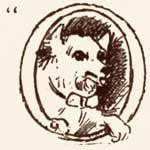
PEN the door, quick, Sybil. Don't you see my hands are full? What a stupid you are! Yes, that'll do. Now you can shut it after me."
And Archie came forward to the table where his aunt was sitting, a large tray spread over with specimens of seaweed that he had been drying and arranging, in his hands.
"Since when, have 'if you please' and 'thank you,' gone out of fashion, may I ask, Archie?" said his aunt.
The boy grew very red, but he laughed good-humouredly.
"I didn't mean to be rude," he said. "But Sybil doesn't mind. Do you, Sybil?"
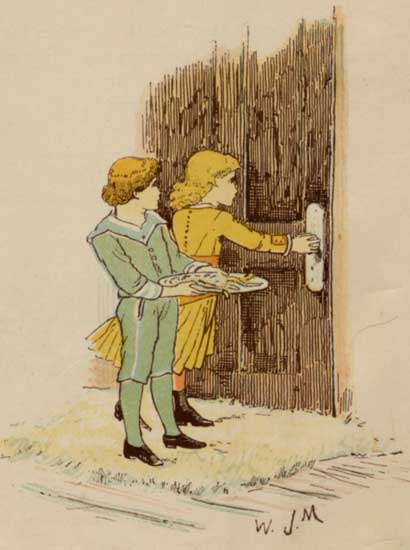
"No," replied the[Pg 25] little girl. "Archie isn't ever really unkind like some boys. Still I think it is nice when people thank you and speak politely to each other. But still, of course, Archie is only a boy."

"And can a boy not be a gentleman, do you think, Sybil? What do you say about it yourself, Archie?"
"Oh, I know I should," he replied rather shamefacedly, "but you see, Auntie, I forget, or else even if I don't forget, it doesn't seem worth while."
"Be true to your instincts, my boy. Civility and gentleness are always 'worth while.' Above all, from man to woman, or boy to girl. And gratitude even for the smallest service is always the sign of a fine nature. That reminds me—"
"Of what? Do tell us, Auntie;" said both children, pricking up their ears.
"Of a little adventure of mine the other day. It is nothing of a story, so don't expect one;" for the word "adventure" had evidently caught their attention. "But it was so pretty and touching, it struck me very much, and made me think how often we might, with benefit, take example by our humble brethren—even in manners, children."
"Do you mean poor people?" said Sybil doubtfully. "I know some are very good and nice—some quite poor children even. But a good many are very rough and rude, Auntie?"
"Yes, and there is much more excuse for them, of course, if they are so, for often they have not been taught better. But I was not thinking of people or children at all just then, Sybil. The little 'gentleman' whose[Pg 26] manners I admired so much was a—" She stopped again and smiled, while Archie and Sybil looked up in perplexity.
"A what, Auntie?"
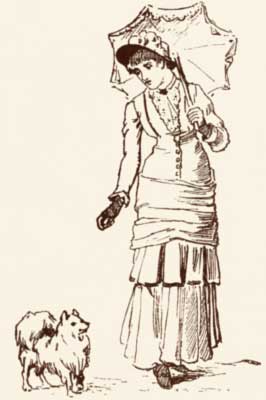
"A little dog, my dears!—Yes, you may well look surprised. Listen and I will tell you all about it. I was going from my own house to a friend's a few days ago, walking leisurely, for I was in no hurry, and had not far to go. It was a quiet time of the day, and not many people were about. I had made my way across our own square and some short way down a street opening out of it when my attention was caught by the sight of a little dog wandering along in an uneasy, rather aimless manner. He was alone evidently, for there was no one in sight whom he could be following—an errand boy or two, a postman and I, were, I think, the only passers-by at the time. And he was far too aristocratic a little dog to have anything to do with butchers' or bakers' boys. He was very pretty and well cared for; his soft, flossy coat had evidently been recently washed and combed, and there was a general air of healthiness and prosperity about him, though he was neither over-fat nor pampered-looking. But just now he was clearly in trouble. He ran a few steps and then looked round him irresolutely; his bright eyes glanced all about him anxiously.[Pg 27] I wondered what was the matter and stopped short half intending to pat him or speak to him, when suddenly, seeming to catch sight of me for the first time, he made the first advances by trotting up to me and sniffing me in an inquiring manner. He liked what he saw of me; for he gave a little quick friendly bark, and then, wagging his tail, looked up at me appealingly, ran on a few steps and then stopped short, looking back to see if I were following him, and when I did so, again he barked, again he ran on a few steps, and stood looking back wagging his tail. It was as plain as any spoken words; he was asking me to do him a service. And thus he led me down the street, round a corner, and a few steps along another row of houses, where he stopped in front of a door, looking and wagging his tail, without going on further. Nobody could have failed to understand him.
"'Here is my home, kind lady. I have got shut out, please to ring the bell for me.'
"I rang of course, and very quickly the door was opened, and in he rushed, and, satisfied that he was all right, I was turning away, when—this is the point of my story—I heard a bustle and fuss just inside the closing door, my friend's bark, rather vehement this time, a voice in remonstrance 'what can he want?' then the door opened and out he sprang again. He looked round eagerly, and as soon as he saw me stood still on the doorstep, gave a quick cheerful little bark, wagging his tail with the greatest energy the while, and with still another 'bow-wow,' turned round and ran in quietly. It was the plainest 'thank you ma'am for being so kind,' that ever was spoken in dog or any language. Now don't you call that behaving like a gentleman?"
"Yes indeed," said the children heartily, and Archie, whose trayful was ready for some other process by this time, turned to Sybil with deference.[Pg 28]
"Please, Sybil, will you kindly open the door?"
She did so, and he disappeared, but in a moment his voice was again heard begging for re-admittance.
"I beg your pardon," he said, "I have come back again to say 'thank you.' If I had a tail to wag I could do so."
But though they got some fun out of it, I don't think Auntie's anecdote did Master Archie any harm.

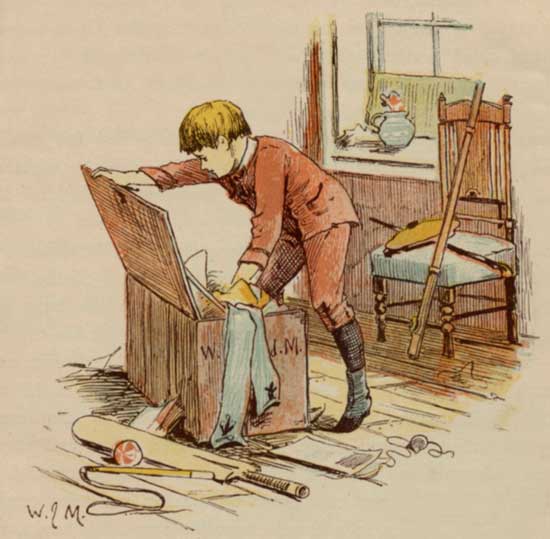
THERE is a bad fairy in this house. I don't care what you say. There must be. Here have I been hours hunting everywhere for my silver whistle. I know I had it yesterday evening, and I haven't been out since, and we can't play at our hunt in the wood without it. And they're all waiting for us. It's too bad—it is," and Leonard stamped about the room, flinging everything topsy-turvy in his vain search.[Pg 30]
"And my umbrella, and my sleeve stud," said David, his two years older brother. "They have completely disappeared. Upon my word, Leonard, I think you're right, this house is bewitched."
"Master Leonard, please, here's your whistle. Cook found it just now lying beside the pump in the garden."
"There now—didn't I say so? It must be a bad fairy. Was I near the pump in the garden last night? How did the whistle get there, if it wasn't bewitched?" said Leonard, as he and David hurried off.
It was true he had not been near the pump, but he had left the whistle among some flowers on the nursery table, and "baby," as his six-years old sister was called, had thrown it into the basket with the remains of her nosegays. What more easy than for the heavy whistle to drop out of the lightly made open wicker work, as the nursemaid was carrying the withered flowers and leaves to throw away? David's umbrella, had he known it, was at that moment reposing in the pew-opener's care among various "lost and strayed" articles at church; and the sleeve stud was safely ensconced in a mouse-hole behind the chest of drawers on which it had been carelessly laid, to be flung off again in a frantic hunt for some fish hooks, whose disappearance no doubt Leonard explained in the same way.
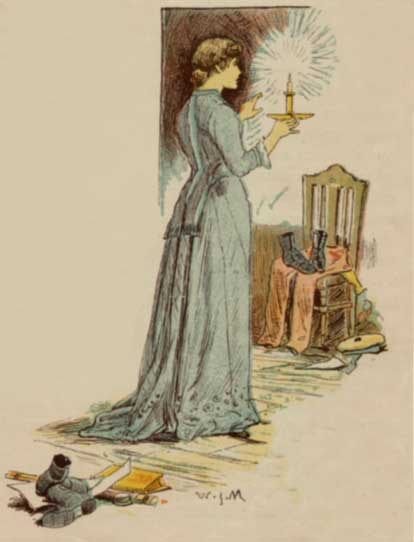
It came to be rather a convenient idea. Not only losses, but breakages, tearings, all such annoyances were laid to the account of the bad fairy. And it was a very heavy account. Never had there been so many unlucky accidents as during these last few weeks spent by the boys and their sister with their mother, in a little country house, lessons being for the time put aside, nothing thought of but fun and frolic. Even old nurse, who usually took charge—too much charge—of the light-hearted careless boys, was away; there was no[Pg 31] one to "worry" about putting things by tidily, wearing the proper clothes at the proper time, and so on. At least so it seemed for a while. But things grew worse and worse, the bad fairy more and more spiteful, till at last even their indulgent mother could take it all quietly no longer.
One evening, finding several of her own private possessions missing—scissors and pen-knife in particular—she came late into the boys room after they were asleep, there to look for them. But she almost forgot her errand in her horrified amazement at the disorder and confusion before her. What a difference from the neat room she used to peep into at night when nurse was at home—everything everywhere, nothing where it should be, almost a sort of ingenuity in the perfection of disorder.
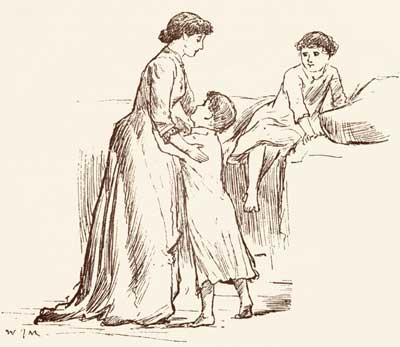
"Really," thought the poor lady, "I could be tempted to believe in the spiteful fairy."
She set[Pg 32] to work, and with a shaded candle, for the boys were fast asleep, cleared away some part of the confusion. But it was of course impossible to do it thoroughly. The next morning, without saying anything, she returned to the charge, in the children's absence. By degrees order gained the day, and in the process many of the missing articles turned up, and were quietly restored to their places. Late that evening again came the motherly fairy. Things were not as bad as the night before—they could scarcely have been so, since the morning's tidying. But they were bad enough. All the boys had had in use during the day was "pitched about" as before—again must their mother work for nearly an hour to get the room quite to her mind. And this went on for several days.
During this time there began to be less talk of "the bad fairy," and more than once both David and Leonard expressed their surprise and pleasure at several things having, as they called it, "come back again;" in other words, having been found in their proper places. And at last on the discovery of a "completely lost" treasure—I think it was Leonard's pocket microscope—in a place where he "knew" he had looked in vain, he burst into his mother's room with sparkling eyes.
"Mamma," he exclaimed, "do you know this house really is bewitched? Fancy my having found my microscope just where I looked for it yesterday. And not only that, ever so many other things have turned up. And when we wake in the morning the room doesn't look a bit the same as it does at night. All our things are as neat as can be, and everything ready, however we pitch them about at night."
Mamma listened and said nothing.
"You don't believe me, I suppose," said Leonard.
"I quite believe that a tidy fairy would find plenty to do in your room, if such a being existed," she said.[Pg 33]
"But all boys are untidy," said Leonard. "I don't think we're—well,"—for visions of really terrible chaos rose before his eyes as he spoke—"well, not much worse than others. But I know what I'll do," he added to himself. "I'll keep awake to-night and watch."
For a wonder he was able to keep his resolution. He was not quite asleep, though David had been snoring for some time, when he was roused by the door softly opening, and a figure with a shaded light, glided into the room. Leonard, though at first a very little frightened, kept his presence of mind, and neither called out nor started[Pg 34] up, but lay still as if asleep. But soon, as he watched the figure moving about, rearranging the untidy heaps of clothes, picking up towels and handkerchiefs, putting boots and shoes neatly together in pairs—all so quickly and deftly, that it might indeed have been a fairy's work, a new feeling overcame him.
"Mamma," he cried—for mamma he soon saw it was—and his voice woke David too, "it is you then—you who are the good fairy! It is a shame for you to have such trouble for us. Oh, mamma, dear, I am ashamed," and out of bed sprang Leonard and David, and set to work with a will to help their mother, in what certainly should not have been left for her to do.
"We will never be so untidy again, mamma, never," said both boys.
"And it will save yourselves and other people a great deal of discomfort, of worse than discomfort, indeed," she replied.
"But, mamma, untidiness isn't such a very bad fault—not like telling falsehoods, or bullying, or anything like that?"
"It is a fault that leads to bad faults," said his mother gravely, "to waste of time and money—two of our 'talents'—to loss of temper, and undeserved blame of others, very often. It makes life ugly and ungraceful, and it puts the burden of our own duty on others. For some one must be tidy, or what would become of the world? And for my part I can never think but what untidiness in outside things too often ends in untidiness of mind and thought."[Pg 35]
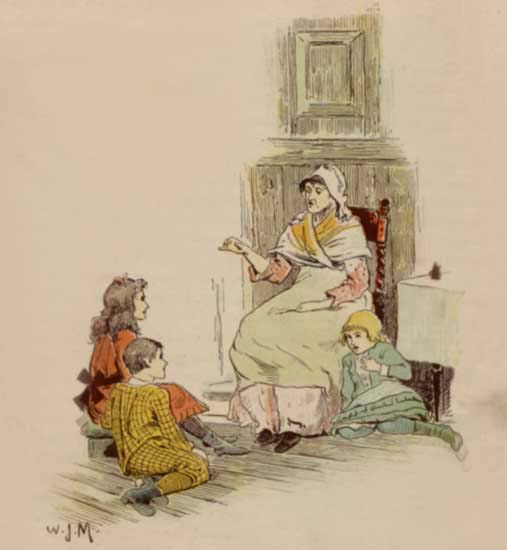
WHEN I was a very little girl, I spent a good deal of my life in a large old-fashioned house in a very out-of-the-way part of[Pg 36] Scotland. It was not really our home, but it almost seemed so, for we used to go there as soon as the fine mild weather set in, and stay till the shortening days and the first frosts told of winter's approach. It was the home of our uncle—my mother's only brother—and as he had never married, and she was many years younger than he, she seemed to him more like his daughter than his sister, and he was never so happy as when he had her and all us children to brighten up his rather gloomy old house. Gloomy it might be in appearance, but in nothing else, for my uncle was the kindest of men, and he and all his old servants used to receive us with a welcome that would have made the grimmest of abodes seem sunshiny and cheerful. I could tell dozens—nay, scores of stories of our child-life in the old castle—of our games in the house, and out of doors, of the cottagers with all of whom we were on most intimate terms, of all sorts of adventures that befel us, but just now, I mean only to relate one very short, and perhaps not very interesting, story, because I think it may be of use to some children who may read it.
I was about five years old when the first cloud came over my happy life. I had been ill, but though I do not clearly remember the illness—and it seemed to me to have been rather pleasant than painful, as I was petted and made much of in every way—I believe it really was a bad illness, and had very much weakened me. We went to Scotland sooner than usual that year to strengthen me, but the weather, unluckily, was cold and rainy. We could not go out much, and had to amuse ourselves in the house. It was in this way that one of the old servants one day, meaning to please us, took to telling us ghost-stories. I was so little that I do not think she thought of me at all; the stories were told to my elder brother and sister, who only laughed at them, and rather liked the sort of "creepy" feeling of mystery which came over them as they listened. And nobody thought of poor little Nan, fanciful and nervous, though[Pg 37] I did not know it, curled up in a corner, and drinking in every word.
From that moment my life was spoilt. I did not distinctly remember the stories: I mixed them up in my mind in a dreadful jumble, and never thought of their not being true. I grew so nervous that I hardly dared go up stairs alone, even in broad daylight, and I shut my eyes if I happened to be alone in a room where there were portraits, rather than see them staring at me, as I fancied they did. But all this was nothing to the terrors of the night, of which, even in my old age, I hardly like to think.
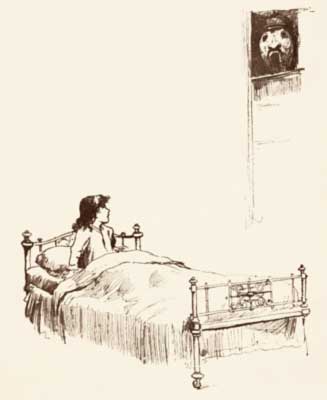
I slept in a little room off my mother's, and till now I had been very proud of my own nest. But all that was past. I now shivered and shuddered at the thought of bed-time, and would have done anything to avoid it. No one understood me, the nurses called me "naughty"; even[Pg 39] dear mamma thought my temper spoilt. And no wonder, for I told nobody of my secret trouble! I think it was my fear of being laughed at, and here I would beg of "big" brothers and sisters never to laugh at little ones' terrors however silly. Try to explain them away, to comfort the poor tiny sufferers, but never laugh at them.
At last, happily for my life and health, the secret came out, and it was in this way:—There was a recess in the wall near my bed; it had shelves and went up nearly to the ceiling; in fact, it was like a cupboard with the doors off. And on the top shelf stood a curious vase, about the size of a rather fat flower-pot, of dark blue and white old Dutch stoneware. I had never noticed it, for in the daytime very little light fell on this corner, and I was seldom in the room except at night.
One evening I was put to bed as usual, feeling rather less frightened, for there were friends dining at the castle, and the sound of the piano came up to my room and cheered me.
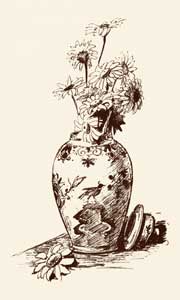
"Leave the door open, please, I like the music," I said, and nurse did so, and thus with less shivering and heart-throbbing than usual I fell asleep. When I woke—quite suddenly—perhaps the shutting of the great door, or the guests' carriages driving away had wakened me—all was quite dark and silent. I shut my eyes, and tried to go to sleep again. But it was no use. I was quite awake, and unconsciously I opened my eyes. What was that? I have said it was quite dark, but up there, high up, there was a light that I had not seen till I turned my head. And there in the light—or did the light come from it?—was a round, staring, white face grinning down at me. I saw its eyes, its mouth, all its features—it seemed to me the goblin face by which a wicked man in one of old Effie's stories had been haunted. I stared at it like a bird at a serpent, though my heart had stopped from terror—then gradually I saw that it was moving, and that roused me. With a fearful shriek I dashed out of bed,[Pg 40] getting by some instinct to the door, and knew nothing more till an hour or two later I opened my eyes to find myself in mamma's arms, for she was just coming into her room to go to bed when I fell into them!
It was all explained to me. There was a tiny window on to the stairs high up in that corner of the room, through which the light of mamma's candle had shone on to the old Delft vase, and even made it seem to move, as she stepped upwards. I was sensible enough for my age to understand and to believe it, but all the same I was ill for a long, long time. And the cloud over my childhood never entirely faded till childhood was left behind. Still good comes with ill. I might never, during the few years she was left with us, have learnt to know my darling mother as I did—her wonderful tenderness and "understandingness"—had it not been for my vision of the "Goblin Face."
The old vase now stands near my bedside, where night and morning I can see it and recall the memories connected with it, and there, I hope, it will stand till I die.
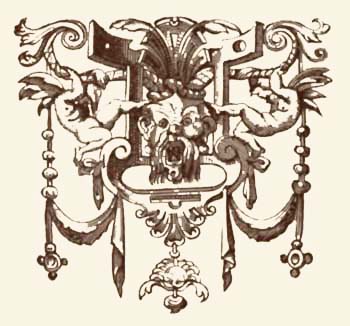

WHAT is the matter, Linda? What are you looking for? It does so fidget me, dear, when I am sitting quietly reading, for you to keep moving about and pulling all the chairs and tables out of their places!" said Grandmamma, kindly of course—she always spoke kindly, but with a little vexation in her tone.
"It's my scissors, Grandmamma—my little beautiful new best scissors with the gilt ends," said Linda plaintively, "I know I left them with[Pg 42] my work last night, and when I unfolded it they were gone. Some one must have taken them—I don't like that new housemaid, Grandmamma. I think she is pokey. I found her fiddling so among the books on the schoolroom table this morning."
"Trying to put them neat, I suppose—not very easy, judging by the state they were left in last night," said Grandmamma. "Linda, my dear, you must not let yourself grow suspicious. I am sure the girl is perfectly honest. I know all about her."
"But where can my scissors be, then?" said Linda. "They're not alive—they can't walk away by themselves."
"Sit down beside me for a few minutes and get cooler about it," said Grandmamma. "Something may come to your mind in a while to throw light on the disappearance. But never suspect others of anything so dreadful as even small thefts unless you are forced to do so. I will tell you a little story which has often served as a warning to me in such a case."
"Oh, yes, do please, Grandmamma," said Linda, the clouds clearing off her face in a wonderful way.
"Years and years ago when I was young, only lately married," began Grandmamma, "a curious thing happened to me. We were living in the country—it was lovely summer weather, and numbers of our friends used to drive over to see us and spend the day. My house was pretty, and I was very proud of it; I had lots of pretty things of all kinds—my wedding presents in fact—with which to adorn both it and myself, and sometimes your Grandpapa used to laugh at me, and call me a little peacock. One of my prettiest ornaments was a small diamond brooch—shaped like a star. It was really meant to wear in the evening, but I was so fond of it, that I sometimes wore it in the day-time. One morning I got a letter to say that an old school-friend of mine was[Pg 43] staying in the neighbourhood, and that she and her husband were coming over to spend the day with us. I was very pleased to hear it, and so was your Grandpapa, as he too knew these friends of mine.

"I hurried over my breakfast, and ran away to give orders to have everything very nice for them, and I think the old cook, who[Pg 44] knew a great deal more about luncheons and dinners than I did, was rather amused at all my charges.
"'It shall all be as nice as can be, Miss Lucy,' she said. She was always forgetting I was married, and calling me 'Miss Lucy'—'You shall see—it shall all be just as nice as it used to be at your dear Mamma's. I'm only sorry that Maria should be away to-day, she has so much taste in arranging the fruit and flowers for the table.'
"'I'll do them myself,' I said, 'and Sophy shall help me. She seems a nice handy girl, I think.'
"'Yes, ma'am,' said cook, 'I dare say she is. But of course it's difficult to judge of a complete stranger. She's a little bit forward for my liking—so very fond of laughing.'
"'But she's so young,' I said, 'and she's never left home before. I think Maria's rather too strict.'
"Maria, I must tell you, was my maid, and Sophy was a young girl whom I had chosen out of the village school to be under Maria. I called Sophy to help me, and very proud she was to do so. We made the table look so pretty, that even the butler condescended to admire it, and then I began to think of adorning myself.
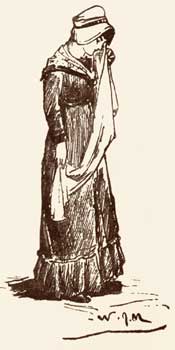
"'You may come and help me to dress,' I said to Sophy graciously which pleased her even more than dressing[Pg 45] the table. I chose a white dress and blue ribbons, for it was very hot; and when I was all ready, I really did think I looked very nice, and I saw by Sophy's eyes that she thought so too.
"'Oh, ma'am,' she said, 'you would just be perfect if you'd put on your little brooch that sparkles so.'
"'My little diamond brooch,' I said doubtfully. 'It is rather too showy for the morning.'
"But I took it out of its case and tried it, and it did look so pretty that I was tempted to wear it, and Sophy looked very pleased.
"Our friends came and we had a most pleasant day. They were delighted with everything—house and garden were certainly looking their best in the lovely summer brightness. We spent most of the afternoon out-of-doors, where I showed them everything, even down to the kitchen garden with its tempting strawberry beds and rows of vegetables of every kind. And when they said good-bye, my old school-fellow whispered as she kissed me, that she thought I was a most fortunate girl. For she saw how kind and good your dear Grandpapa was. After they had left, he proposed that we should go a ride, as it was getting cooler. I ran up stairs and changed my dress for my riding habit, calling to Sophy to put everything tidy in my room. We came in just in time to dress for dinner, and the bell sounded before I was quite ready.
"'My brooch, Sophy,' I said, 'you put away my things.'
"Sophy looked about, but no brooch was to be seen.
"'It must be there,' I said, 'find it while I am at dinner.'
"But when I ran up after dinner, Sophy met me with a very red face and eyes that looked ready to cry, and told me it was nowhere to be found!
"I cannot tell you how we hunted. When Maria came home the[Pg 46] next day she was dreadfully vexed, and inclined to blame me for having let Sophy be so much in my room.
"'You don't think she has taken my brooch,' I said. But Maria would not answer decidedly. She only murmured something about not trusting strangers! Weeks went on—I tried not to think about my brooch any more, but it had made a talk in the house, and Sophy felt it painfully, and when at last she said she would rather go home, I could not but feel it might be better. The very day before she was to leave I was startled by a message from cook asking me to go to see something in the kitchen. It was afternoon—an unusual time for her to want to see me, but I went at once.
"There stood cook, her kind old face beaming with pleasure.

"'Just see here, Miss Lucy,' she said. On the dresser lay a cauli[Pg 47]flower she was on the point of preparing for cooking. She pulled aside the big green leaves at the top, and there, nestling on the creamy-looking surface underneath, lay my diamond brooch! It had dropt from the front of my dress, no doubt, that day in the garden, and the baby cauliflower's leaves had grown over it!
"You can fancy my joy, Linda, and still more the joy of poor Sophy. Instead of leaving, she lived with me more than twenty years. But what's the matter now, Linda? Are you not listening?"
"Oh, dear, yes, Grandmamma, and I do so like the story. But I just saw something shining on the frill of my dress, and see here!" And Linda held out her scissors, which had caught in a flounce.
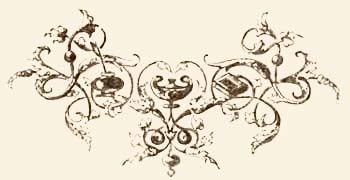
THIS is not a story that I am going to tell you. It is just a little thing that happened one day when I was out walking, and which I have never forgotten.
It did not happen in London, but in Paris, where I was then living. Some of you may have been there, and if so you know better than I can tell you what a very pretty, bright and charming place it is. That is to say, the best parts of the town are pretty and bright-looking, especially in sunny summer weather. But there are poor parts of Paris too, though you are not likely to have seen them, and alas, there are many very poor people also!
I was walking that day in the long road, or avenue rather, which is called the Champs Elysées. It is very wide indeed, and bordered on both sides by beautiful trees, among which in the summer are to be seen quantities of well-dressed people walking about or seated, and enjoying the lively scene around them. Children by the score are there too—richly dressed and playing at all sorts of games, attended by their governesses or nurses, and all this, joined to the constantly passing brilliant carriages, makes eyes unaccustomed to the sparkle and glare soon get weary. Even I, used to Paris and its ways as I was, felt tired of the whirl and rush, and I thought to myself I would turn out of the wide thoroughfare and make my way home by some quieter side street.

I was standing at the edge of the pavement with this intention, waiting till there should come a safe moment to cross, when I caught sight of a[Pg 49] little group not far from me, and I could not help watching what was going on, with interest. A flower-cart was drawn up at the side of the road. Though it was scarcely yet full summer, there was a good display of flowers, and many of those passing stopped to buy. Among these were an old gentleman and a little boy. One could see without being told that they were grandfather and grandson. The child said a word or two to the gentleman, who let go his hand and walked on slowly. The little boy waited patiently for a minute or two, till those before him round the cart had been served, and then he came forward and made some inquiry of the flower-woman. I could not hear what he said, but he was no doubt asking what he could have for his money, for once or[Pg 50] twice a shade of disappointment crossed his bright face, and he looked doubtfully at something he held in his hand, which I afterwards saw must have been his few coins. I felt so sorry for him that if I had not been afraid of giving offence, I would have offered him the little sum he was evidently short of, but after half starting forward to do so, I drew back again. The boy, though simply, almost poorly clad, had too much the air of a gentleman, and so had the old grandfather, whose stooping figure I still perceived slowly walking on in front. At last the boy, after peering all over the flower-cart, caught sight of a little nest of violets—sweet-scented violets—in one corner, which had been almost hidden by the larger and more brilliant plants. His face lighted up joyfully, as he pointed them out to the flower-woman, and she, in turn, smiled and nodded pleasantly. Poor thing—she could not afford to lower her prices, but the working classes in France have great sympathy with small means and the economy they oblige, and I could see that she was glad for her little customer not to be altogether disappointed of his purchase.

She chose carefully the prettiest and freshest of the violet bunches, wrapped an extra leaf or two round the stalks to keep them cool, and handing the little bouquet to the boy, smilingly received from him the coppers till now tightly clasped in his hand.
And with all the brightness back in his face again, the little fellow bounded[Pg 51] forward to rejoin his grandfather, as light-hearted and light-footed as a young chamois.
I crossed the road and walked on. The little incident had interested and pleased me. I could not help wondering for whom the flowers were intended—a sick mother or grandmother perhaps. The child was not improbably an orphan, seeing that he was in the care of a grandparent. And I went on picturing to myself the simple thrifty home to which the pair were by this time wending their way, little thinking that I should ever see either of them again.
I was by now in one of the handsome side streets, running parallel with the great avenue. It was quieter here; there were fewer carriages or foot passengers, so that on the wide road, even a small group was[Pg 52] plainly seen, and happening to glance backwards, I saw a sad little procession making its way slowly along. Two men, dressed in black, were carrying a little coffin—no heavy burden, it was plain—yet heavy was the sorrow of the two mourners following close behind. It was but the funeral of a tiny child, a baby, or scarce more than a baby to judge by the size of the coffin, "the only one" of the poor father and mother alone in their grief, who walked behind. They were of the very poor class of Paris working people, though decently clad, as is almost always the case in France, but too poor to have got mourning for themselves, even for the funeral of their child. The woman, it is true, had a black skirt, but over it she wore, perhaps to conceal its shabbiness, a clean checked cotton apron, and the poor father had no attempt at mourning, except a little band of rusty black fastened round the left sleeve of his blue working blouse. They were both weeping, the mother openly, her poor eyes swollen and red as if with many hours of tears, the husband trying to keep calm, as he from time to time wiped his weather beaten cheeks with his sleeve. Their poverty was shown in another way; there was not a single flower, much less a wreath or cross on the little black-draped coffin—so sad, so piteously desolate a funeral it has seldom been my lot to see in Paris. Yet poor as it was, it met with the outward marks of respect and sympathy which I often wish we could see in England, for every head was uncovered as it passed on its sorrowful way. I stood still for an instant to watch it; suddenly a small figure, rushing across the road, darting nimbly in front of a quickly advancing carriage, as if afraid of being too late, caught my eyes. It was my little friend of the violets! There was no mistaking him—and his grandfather's, it seemed to me, almost familiar figure, waiting and looking after the child from the other side of the road. What is the boy in such a hurry for? Ah—I see now, and my own eyes are not free from tears.[Pg 53]
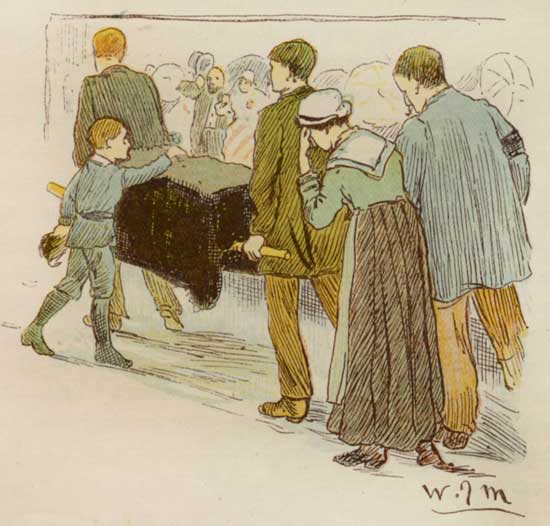
Breathless and eager he runs up to the poor little procession, with blushing face and gentle hands he lays on the tiny coffin his treasured violets—beautiful in themselves, doubly beautiful as the gift of a sweet and pitiful heart—and without waiting for the thanks ready to burst forth from the over-laden hearts of the two parents, hastens back again to his old grandfather, whose face I can distinguish lit up with a smile of tender approval.
"God bless him," the poor father murmurs. I am near enough to hear it—"God bless him," the weeping mother repeats.
"God bless him," I whisper to myself.
"Inasmuch as ye have done it unto one of the least of these My brethren, ye have done it unto Me."
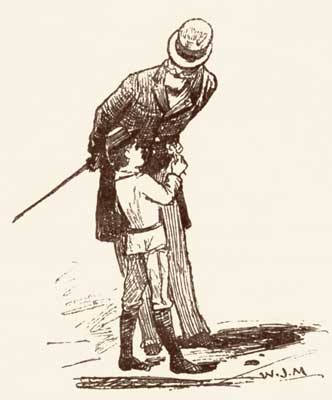
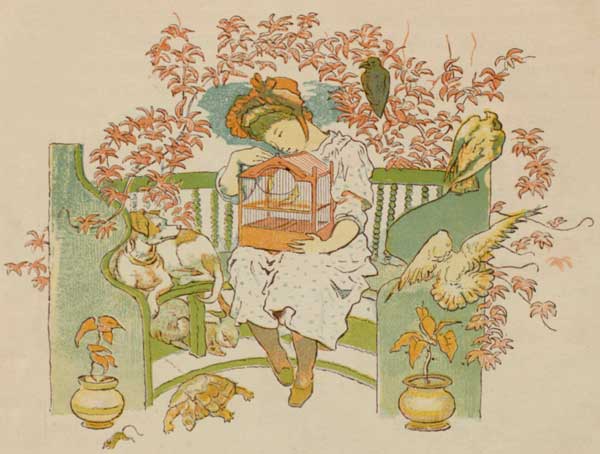
WHEN I was a little girl—that is about three years ago—I am now thirteen—my own particular pets were a pair of canaries. We had lots of other pets; it would take me a very long[Pg 55] time merely to give you the list of them even without telling you anything about them, and all their adventures and funny ways. But a good many of them had in one way or another come to grief, poor things, and as my brothers grew older and had less time to take care of them, my mother said we must really give up having so many.

So one summer, just before the holidays, there was a regular flitting—the turtle-doves we gave to a little neighbour, a very gentle boy, who we knew would be kind to them; the old crow was taken to a house more in the country than ours, where there were plenty of nice, dark, crowy-looking trees; the rabbits were already all dead, and so was the tortoise, and as one of the dormice had got loose and gone off to live with the house-mice, we sent the other to a friend who had several. There remained only the dog, whom of course we couldn't give away and my canaries, whom I got leave to keep.
These canaries had a history of their own. One, we had reared ourselves from an egg, and as it was the only baby canary that had grown up of all we had had, we did think it very remarkable. Its name was "Frise-tête," which means "curly head," because it had a funny little tuft of yellow feathers right on the top of its head, and he was the cock canary, though Frise-tête sounds more like a girl's name, doesn't it? And the little hen canary was called "Coo-coo," because when she first came to us she really did make a sort of cooing noise. Where she came from we never knew—she flew in at the open window of the schoolroom one day, having evidently got out of her cage and lost her way. She was a sweet-tempered little bird, but not at all sharp or clever. She didn't seem to mind in the least that she had got into a strange place, but was quite content and happy to take up house, or "cage," with Frise-tête. This little couple made the last of our pet canaries, and they were always counted mine. I think we had had Frise-tête two years, and[Pg 56] Coo-coo more than a year, when there came the clearing-out of pets that I told you of. But we never knew Coo-coo's age exactly, you see.
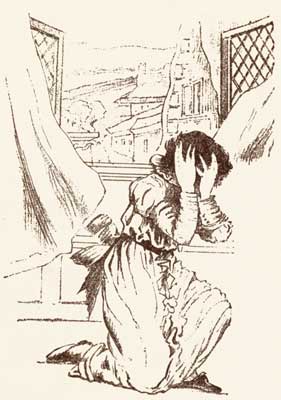
That summer we were going in different directions. My two big sisters were to spend it with our grandmother, and one of my brothers with them. The other brother and I were to go to Germany with Mamma. We were very proud of being chosen to go with her, and we had never been to Germany before, at least not to stay any length of time there, and we were in great spirits about it. There was only one thing that troubled me, and that was about the canaries. I was so afraid Mamma would not consent to take them, and yet I could not bear the idea of leaving them behind. I was sure that the person who was to take care of the house would forget to feed them, or let the cat get to them or something, and at last I told Mamma that I really would be too unhappy if I mightn't take them. Mamma was very kind—she didn't like the idea of the pretty little couple being starved or killed any more than I did, still she warned me that I should find them a good deal of trouble on the way, and that I mustn't grumble at it, which, of course, I promised I wouldn't.
So when we set off late one hot summer evening, on our long journey,[Pg 57] I carried carefully, a queer-looking package in one hand. It was the cage, all covered up in a sort of brown holland bag, which contained my beloved Frise-tête and Coo-coo.
They were a great worry. I often wished I had left them at home, I can assure you. We had to travel two nights, and most part of two or three days before we got quite to our journey's end, though we stopped two or three times on the way, and it was so hot that we felt very tired and uncomfortable, and it was not easy to keep good-humoured even without the birds! Very often I had to sit with the cage on my knee if the railway carriage happened to be rather low, and there was not room for it up beside the cloaks and rugs. And then I had to have water in a bottle to keep the poor things supplied, and very often it spilt all over, and so did the seed, and our fellow passengers looked very cross at me. And sometimes at the stations, the guards and railway people wouldn't let me pass without undoing all the cover and everything to see what the wonderful bundle was. Oh, we were very glad when we found ourselves at last safe at the place we were to stay at! It was a very old-fashioned little town, but it was almost like being in the country. There were such beautiful walks all about, and from the end of every street one could see the fields and trees, so you see it wasn't a bit like a town.
We had rooms in a very nice funny old hotel. Mamma said it was quite like an old-fashioned English inn, such as they used to be in the coaching days. The ceilings were low, and the staircase very wide, and the furniture so old-fashioned. We had a nice large sitting-room, and two bed-rooms out of it, and on the wide window-sill of our bedroom I established Friste-tête and Coo-coo. They were very sensible, poor things, they only fluttered and fussed about for a short time, and then settled down quite contentedly, which, I am sure, was very good behaviour after being so much covered up.[Pg 58]

I could tell you lots of stories about our life in the old German town, but I must remember that this story is to be all about the canaries. It was beautiful sunny weather, and they spent nearly their whole time at the open window—I used only to bring them in at night. And every morning I cleaned the cage out nicely, and put fresh sand and water, and seed, and groundsel. The people at the opposite side of the street got to know me quite well by sight, and would smile and nod to me.[Pg 59] And all was as happy as possible till one sad day which I will tell you about.
Mamma had two or three times said to me, "Take care, Sally, when you put the cage on the window-sill to see that it is quite steady. The sill is broad and even, inside, but outside the stone slopes downward," and I had always taken care.
But this morning, just as I had finished cleaning and all, I saw a piece of sugar on the table, which, it suddenly struck me would be a nice treat for the canaries. I sprang across the room hastily to get the sugar, and was just turning back with it, when a smashing, crashing noise made me start. It was—no I can hardly tell it, even now I remember the horrible feeling—it was the cage falling, fallen out of the window, down into the street below. I screamed and rushed into the furthest corner of the room, shutting my eyes and clasping my hands over my ears. It was very silly I know, but I was really almost out of my mind.
"They are dead, they are killed!" I cried screaming again so loud that Mamma rushed in from the next room to see what was the matter. She saw it in an instant without my speaking, and indeed I was by this time choking with sobs.
"Stay there, Sally," said she, and down stairs she ran. I just took my fingers out of my ears for an instant, but I heard a hubbub in the street below, and I shuddered and put them back again. It was too horrible.
In a few minutes Mamma came up, carrying something in her hand, and looking very sad.
"Sally dear, I am very sorry for you," she said, "but it might have been still sadder. Coo-coo seems very little the worse—she has had a wonderful escape. But poor Frise-tête is dead. I have brought him up—I think he must have been killed at once, and not have suffered."
It was some time before she could persuade me to look at my poor pet.[Pg 60] It was indeed a sad sight. Even the death of a little bird is sad, I still think. His pretty yellow feathers all rumpled and torn, his bright eyes glazed and filmy.
"Oh, my dear, sweet Frise-tête," I said. "To think that I should have brought you all the way from home for this."
And poor Mamma was so sorry for me that she actually cried too!
We made a little coffin out of some cardboard, and wrapped him in cotton-wool, and buried him in the old garden of the inn. That was the end of our canary nursling. I have a good deal more to tell you about Coo-coo, but for the present I will leave off with this piece of advice. "Never put bird-cages on the window-sill."
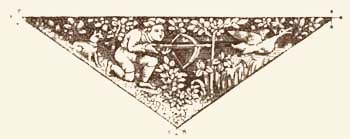

I TOLD you the sad end of poor Frise-tête, but the history of Coo-Coo is by no means finished yet. She had not escaped without any injury, though at first we thought she was not hurt. But as soon as she recovered a little from her dreadful fright we saw to our great sorrow that one of her wings hung down in a most sad and helpless manner. I turned away shuddering.[Pg 62]
"Is it quite broked, Mamma?" asked my little brother Charley. He looked at it with the greatest interest and curiosity. "Horrid little boy, I said to myself! And it does seem sometimes as if boys had very little feeling, though I don't really think so of poor Charley.
"Oh, Mamma," I said, still shutting my eyes, "if she is so badly hurt, it would be better to put her out of her agony at once. Couldn't you give her chloroform or some stuff like what they kill horses with in the streets in Paris?"
"It's not so bad as all that," said Mamma cheerfully. "Sally, you mustn't be silly. Open your eyes—there is nothing dreadful to see."
I had to open my eyes then—Mamma was holding Coo-coo tenderly in her hand. I wondered how she had courage to do it. The poor little thing seemed to know her, and to nestle down confidingly.
"I don't think it hurts her except when she tries to stick it out," said Charley.
"No, I don't think it does," said Mamma, "but I'd like some one who understands little birds, to see her."
"If the gracious lady will excuse me saying so," said the landlord's daughter, who was standing close by full of sympathy, "there is a gentleman near here who makes it his business to bring up little canaries from eggs. He is very clever. We might go to see him, and ask him to look at the poor wing."
"Certainly," said Mamma, "that would be a very good idea. But I don't quite know how to take Coo-coo. I am afraid it is not good for her to hold her so long in my hand, and the cage is completely smashed."
"We have an empty cage—a very small one, that used to hang at the door with our old starling," said the good-natured Anna, and off she ran for it.[Pg 63]
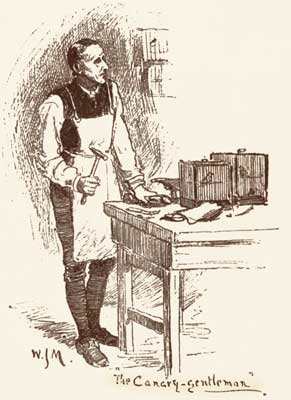 "The Canary-gentleman."
"The Canary-gentleman."
We settled Coo-coo as well as we could with some cotton-wool for her to rest upon. But once in the cage, so long as she did not attempt to flutter about, she did not seem very bad, and my spirits rose a little. Still we must have seemed rather a doleful procession making our way along the street, for my face and eyes were swollen with crying, and Charley looked very grave, as we followed Mamma and Anna, Mamma carrying the starling's cage containing poor Coo-coo, as if it was the most wonderful treasure that ever was seen. And all the people came out of the shops and houses to look at us, for already the news had spread of the terrible misfortune that had happened to the little "foreign" lady, and several people whose shops we had sometimes been to nodded their heads, and said, "Poor little Miss," very sympathizingly, as we passed. I couldn't help feeling rather ashamed, and I wished my eyes were not quite so red.
It was such a funny place where the gentleman of the canaries, as Anna called him, lived. We went down a very narrow passage, and, across a little court-yard and down another passage and up a rickety stair and at last found ourselves in a room filled with birds—nothing but birds, and all canaries! There were cages and cages full of them—grown up ones and old ones, and baby ones just[Pg 64] hatched. Some were singing brilliantly, so that we could scarcely hear ourselves speak, and the man who had come forward to meet us took us into another room, a little kitchen, where there were only one or two cages and no noise.
He was a shoemaker as well as a birdfancier—he had on a leather apron, and he had a half-made boot in his hand when we went in. But plainly, what he considered his real calling in life was canaries—I think indeed he thought the world was made for canaries, and he only looked at us with interest because "we belonged to Coo-coo," as Charley said.
"It is not broken," he said, after he had carefully examined the poor wing, stretching it out in a way that made me shiver to see; "it is only sprained. It will get better, but it will perhaps never be quite well. See—this is all that can be done," and he took a feather from a cup with some fine oil in it, standing on a table. "You must paint it with oil—so—two or three times a day. You see?" and Mamma nodded her head, and said, yes, she quite understood.
"She will get better," repeated the man, "she will not die of her wing, but she will die of loneliness. You must get her a companion."
I came forward eagerly.
"Mamma," I said, "would he sell us one? I have two marks." A mark is the same as a shilling.
Mamma asked him the question. He looked round his many cages doubtfully. "I did not want to sell any just now," he said, and I really don't think he did. "But it would be a shame for her to pine to death. Yes—I can let you have one of these young birds for three marks. Choose which you like," and he pointed to a cage containing three or four.
"I have only two marks," I whispered.[Pg 65]
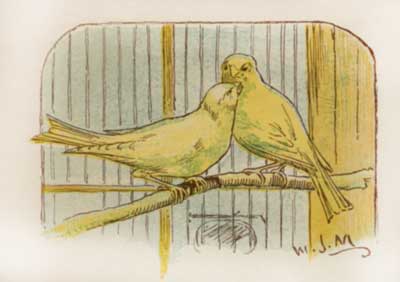
"And there is a new cage to get," said Charley. But Mamma was very kind.
"I will help you," she said. "Yes, sir, we will take one of these. You are sure they will be friends?"
"No fear," said the man in his queer, jerky way, "and this young bird will sing like a heavenly angel next spring. Will you take him now, or shall I bring him this evening?"
"We have to get a new cage," said Mamma; "I should be glad if you would bring him."
Then we set off again with Coo-coo in the starling's cage, and we had another procession down the street to the ironmonger's shop, where we chose a beautiful cage. It was awfully kind of Mamma, wasn't it?
And that evening after poor little Frise-tête was buried in the garden under a little rose-bush we made the new cage all ready, and Coo-coo and[Pg 66] the new bird, whom we fixed to call "Fritz," as he was a German, took up their quarters in it. They were very good friends—indeed Charley and I thought it rather horrid of Coo-coo to be so quickly consoled.
"I don't believe she has any heart at all," I said. "I don't believe a bit that she would have pined alone."
But the "canary-gentleman," every time he came—and he was really very good, he came every two or three days to see how the wing was and would not take any more money—assured us that if she had not had a companion she would have died.
And certainly I must say that Fritz deserved her to like him. He was so good to her. You could scarcely believe a little bird could have had so much sense. For some days she could only move about stiffly, and it was difficult for her to pick up seeds. And just fancy, Fritz used to bring her seeds in his beak and feed her! It was the prettiest sight possible.
Her wing never got quite well, though it left off hurting her. But she never could stretch it out quite evenly with the other. And about a year ago, after two years of peaceful life with Fritz, she died quite suddenly. She was perfectly well the evening before, and early the next morning she was lying in a little rumpled-up heap in a corner, dead! Poor Coo-coo—they thought she died of old age. I can't help wondering where birds go to when they die—they are so innocent!
Still they are very heartless. That very morning beside his poor little dead wife, Fritz was pecking away at his seeds and singing as if nothing were the matter. So we have not troubled to get a new companion for him, and when he dies I don't much think I shall care to keep any more pet birds. He is very alive at present however. He really sings so very loudly sometimes that we are obliged to cover him up with a dark cloth to pretend it is night.
I hear him carrolling away now as brilliantly as possible!
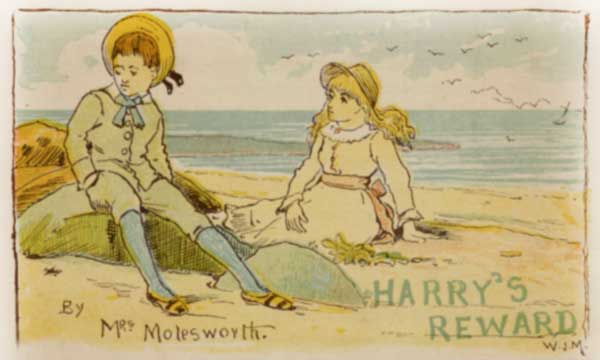
HATE the sea, I hate bathing, and I don't want to learn to swim. What's the use of learning to swim? I'm not going to be a sailor. I don't like ships, and I don't want ever to go in one, and I just wish, oh, I do wish papa hadn't come here!"
"Harry! how can you?" said his sister Dora. "Papa who is so kind, and when we have all been looking forward so to his coming."
"I know—that's the worst of it," said Harry. "I've been looking forward as much as any one, and now it's all spoilt by his saying I must learn to swim."
"I only wish I could learn!" sighed Dora. She was two years older than Harry, but she had lately had a bad fever. The family had come to the seaside to give her change of air, but not for[Pg 68] some weeks yet, if at all this summer, was poor Dora to be allowed to bathe. And she loved the sea, and bathing, and boating, and everything to do with the sea. She was like her father, who, though not a sailor, had travelled much and far, both by land and water; whereas Harry "took after," as the country people say, his mother, who had lived in her youth in a warm climate, and shivered at every breath of cold or even fresh air. It did not matter so much for a delicate lady to be afraid of the wind and the sea, but it was a great pity for a healthy boy to be fanciful or timid; and Harry's mother herself was very anxious that he should become more manly. She was very disappointed that she could not get him to bathe when they came to the seaside, but it was no use, and she and nurse and Dora all agreed that the only thing to do was to "wait till Papa came."
Papa had come now, and Harry had had his first "dip." It wasn't so very bad after all, but just when he was getting up his spirits again, and thinking ten minutes or so every morning were quickly over, all his fears and dislike grew worse than ever when his father told him that in a day or two he should begin to teach him to swim.
"Everybody, especially every English man and boy, should know how to swim," Papa had said. "There is never any knowing the use it may be of, both for one's self and others."
"Isn't it very hard to learn?" Harry asked, not venturing to say more.
"It takes some patience," his father said. "But by the time I have to go—in three weeks or so—you should be able to swim fairly well, if you have a lesson every day."
And Harry came home to tell Dora his troubles, which he worked himself up to think were very great ones indeed.
There was no shirking it however. Papa, though very kind, was very[Pg 69] firm, and once he said a thing, it had to be done. So with a rather white face, and looking very solemn, poor Harry set off every day for his swimming lesson.
He was a quick and clever boy, and a strong boy, and this his father knew. He would not have forced Harry to do anything for which he was unfit, or that could have done him any harm. And after the first shivers of fear and tremulous clinging to his father's hand were got over, it went on better and faster than could have been expected. Harry didn't mind its being difficult once he had left off being afraid, and a day or two before his father had to leave them, Harry had the pleasure of hearing him say to his mother, "He swims already very nearly as well as I do myself."
Now I shall tell you why I have called this little story "Harry's Reward."
Seacliff, the place at which these children were spending the summer, was not a fashionable watering-place, with terraces and donkey-carriages and bathing-machines, but a little village, where one or two cottages were to be had for the season. There were also a few gentlemen's houses in the neighbourhood, so that in fine weather merry groups met at the little sheltered bay among the rocks, where the bathing was pleasantest.
One day, not very long before they were to leave Seacliff, Harry, having finished his own morning swim, set off to walk home at his ease, whistling as he went. He had chosen what was called the high path, a footpath up above the lane, which was the regular road from the village to the beach, but from which the lane could be seen all the way.
It was a lovely morning—bright and peaceful—and Harry, as he went, wished that poor Dora had got leave to bathe.[Pg 70]
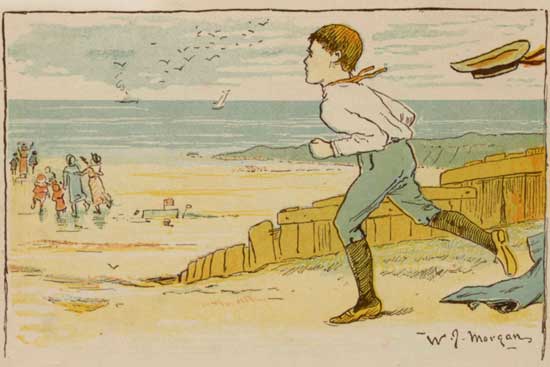
"Next year," he thought, "I hope we shall come again, and then what fun we shall have. Dolly will learn to swim in no time."
Suddenly a sound disturbed his pleasant thoughts. A horse and cart or carriage of some kind was rushing wildly along, coming nearer and nearer. Surely the horse, or pony, as Harry now saw it to be, was running away. The boy who had never been a coward except about "sea things," tumbled down the steep grassy slope in no time, and stood in the middle of the road eager to see what he could do. The flying vehicle was near enough now for him to see that it was the pony-carriage of two girls, a little older than Dora, whose home was one of the pretty houses a little way from Seacliff. He had often seen them drive down in it to the shore to bathe.[Pg 71]
But what a queer figure was driving now. The pony was not running away, on the contrary, it seemed as if it could not run fast enough to please the driver; a girl with hair streaming, dressed only in a blue flannel bathing gown, streaming too, who stood upright in the carriage, lashing the poor pony as if she were mad, while from time to time she screamed, in a shrill and yet choking voice, "Help, help—for God's sake, help!"
"What is it?" screamed Harry too, as she passed. She would not stop, but she threw back some words on the wind.
"My sister—Alice—drowning. Going to the village to fetch some one—can swim."
And then again came the terrible cry, as if she hardly knew what she was saying, "Help, help!"
"Oh," thought Harry, "if she could have stopped and taken me back, we'd have been at the shore in a moment. I can swim. I can swim."
And he could run too. It was not so very far from the bathing-place. How he got there Harry never could tell. On he rushed, tearing off his clothes as he went. Off flew hat, jacket, collar and shirt, till there was nothing but trousers and tennis-shoes to pitch away, as in his little clinging woven drawers only, brave Harry flung himself, fearless and dauntless, into the sea, and struck out for the round dark object, poor Alice's head, which it had taken but an instant to point out to him.
"I can swim! I can swim!" were the magic words with which he was able at once to push off the friendly hands that would have drawn him back, whose owners now stood watching him with flushed faces and tearful eyes, murmuring many a fervent prayer for his success, or saying aloud with clasped hands, "The brave boy, the splendid little fellow! It is her only chance!"[Pg 72]
It was her only chance. Long before poor Lilian, for all her headlong drive, was back with a sailor she had met just outside the village, Alice would have sunk to rise no more. She had been caught by the current and carried out far beyond her depth, and when Harry, panting, labouring, but swimming valiantly still, got near enough to catch the long plait of hair, and so draw her gently after him to shore, she had all but lost consciousness. Better so, perhaps, for had she struggled or clung to him, both would have been lost.
As it was, there were plenty of hands to carry them to land, once they were within a safe distance; but Harry was the hero, Harry, alone and unaided, had saved a human life, for of all the score or so of watchers on the beach, not one knew how to swim.
Was not this worthy to be called his "Reward?" even if the thanks of the two pretty sisters and their parents had been less fervent and heartfelt.
Harry and Dora go often to Seacliff now, even without the rest of the family; for there is a house near there where they are always most welcome visitors, and where the only fear is that if Harry were not a very sensible boy, the attentions of Alice and Lilian might spoil him.

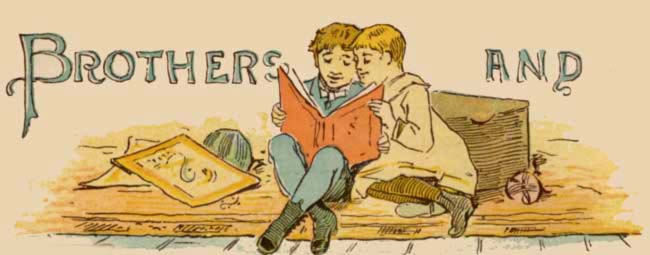

AMMA was very fond of mushrooms. I don't mean to say that she was a greedy person or fond of eating, but if she had a weakness, it was for mushrooms. When she was a little girl, she had lived in a country place where they grew in abundance, and she had often told the children how delightful it was to go mushroom gathering, how pretty the creamy-white heads looked, sometimes almost hidden in the grass, like eggs in a mossy nest, and what shrieks of fun and eagerness used to be heard when some specially fine one was suddenly caught sight of.

But Mamma's own children, Lancey and Dick—Mamma was not very rich in children, she had only these two little sturdy boys, Lancey was nine and Dick was seven—had never had the good fortune to live in a mushroom country. All they knew of mushrooms was when they some[Pg 74]times happened to catch sight of them in the kitchen, when cook had bought a little basket of them, paying very dear for it, no doubt, because "Missis was so partial to them." And there was great rejoicing, as you can fancy, when one autumn Mamma told her little boys that they were going down into the country to spend September with an old aunt, who lived not far from where Mamma herself had lived when she "was a little girl."
"And is there those funny things—mush—mush—I forget the name—there?" asked Dick.
"Mushrooms?" said Mamma. "Oh, yes, in September there will be plenty, no doubt," she replied.
"And your birthday's in September," said Lancey. "Oh, Mamma, oh, Dick!" he went on, giving a great spring in his delight, "just think—we can gather mushrooms for it—nice, wild mushrooms, that taste ever so much better than the ones you buy in the shops, don't they, Mamma, darling?"
"Than forced mushrooms, you mean, Lancey," she replied. "Yes, forced mushrooms, that means mushrooms grown in hot-houses, or hot-beds;" for she saw on the boys' lips the question, "what are forced mushrooms, please?" "never have the same flavour, I am sure. Besides, one hasn't the fun of hunting for them, and gathering them one's self. I am sure you will enjoy that part of it."
"I am sure we shall. I am sure we shall like Fernimoor much better than the seaside," said both boys—"even though we have liked it very much," added tender-hearted Dick. He was so afraid of Mamma being at all hurt, if she fancied he meant that they had not enjoyed the seaside after all the trouble and expense she and papa had been at to take them there. For, as he told Lancey afterwards, he was sure he had seen Papa pay three gold pounds for their railway tickets at the station the day they came[Pg 75].
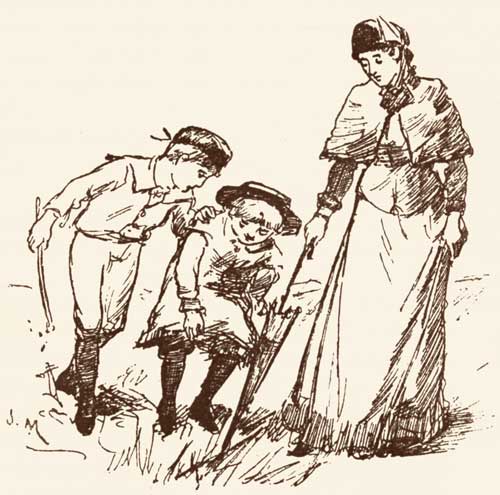
"I hope you will enjoy it very much," said Mamma kindly, "and I am sure you will, and so shall I. It will be so nice to show my little boys some of the places I loved when I was as little as they are."
"And to teach us how to find musherrooms," said Dick, quite satisfied he had got the hard word right this time.
Fernimoor turned out to be very nice, quite as nice as the boys' pleasantest fancies had pictured it. The old-fashioned house was the funniest and prettiest in the world, so was the garden, and the uncle and aunt were the kindest and nicest of old uncles and aunts. There was only one disappointment—and that was the mushrooms![Pg 76]
There had been a good crop of them, said Auntie, a week or two ago, but since then it had been so dry—the whole season had been unusually dry—that there were none at all. Possibly in another ten days or so, if it rained, there might be another crop, but then one scarcely dared wish for rain, it would be so bad for the harvest.
So Mamma and her two little squires wandered about the fields in vain, seeking for the pretty creamy egg-like balls among the grass, which Mamma had so often described.
"It can't be helped," she said. "It's better than if it had done nothing but rain. That would have spoilt our visit, even if we had had basketfuls of mushrooms."
But Lancey and Dick didn't seem quite sure that they agreed with her. They had got the idea of mushrooms so in their heads that I don't think they would have grumbled even if it had rained.
"If only there are some before Mamma's birthday, it won't matter so much," said hopeful little Dick.

Mamma's birthday was the thirteenth of September, and that year it fell on a Monday. All Friday and Saturday it had rained—really poured—and every one was surprised that Lancey and Dick did not grumble at it. By Sunday morning it cleared, and Lancey who was dressed first, ran out into the garden for a stroll before breakfast. Here he met a friend of his—an under-gardener, who had come to do some little piece of[Pg 77] work about the hot-houses, which could not be neglected even on Sunday.
"Fine morning, Master Lancey," said the lad. "My, how it did pour yesterday!"
"Griffith," said Lancey, "will the rain have brought up any mushrooms, do you think?"
"Bless you, yes. See here, Master Lancey, just you go down the lane to the left of the lodge till you come to a cottage, then creep through the gate opposite—it's awkward to open, but you'll easily get through—and see if you don't find mushrooms. There'll be lots by to-morrow if we've some sun to-day."
"It's to-morrow I want to get them—to-morrow morning early," said Lancey. "Thank you, Griffith."
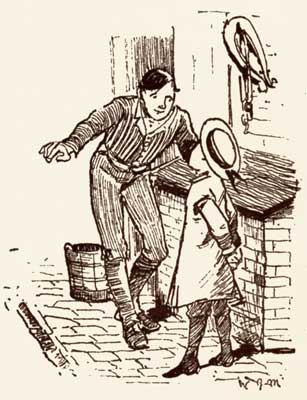
After breakfast, Dick in turn went out for a little fresh air—he strolled towards the stables, as he was very fond of one of the dogs there. On his way he came across a groom called Nicholls.
"Good morning, Nicholls," said Dick. "Should you think, Nicholls, there'd be any mushrooms by to-morrow morning?"
"Sure to be, Master Dick. If you're up early, I'll show you the best field in the place for them. Come out to the stable-yard as soon as you're dressed, and I'll show you the way."
"Thank you, Nicholls," said Dick. "Yes, I'll come. Don't tell anybody else, Nicholls."[Pg 78]
"No, no, sir, we'll keep it a secret."
Lancey and Dick went to church together and were together as usual all day. But strange to tell, not one word was said by either boy to the other about their plans for the next morning. Some mischievous sprite had put it into their heads, for almost the first time in their lives, to have a secret, and not a kind secret either, each from the other.
"I'm the eldest," thought Lancey. "I think it's only fair I should get the mushrooms for Mamma's birthday."[Pg 79]
"Lancey's bigger and stronger than I am," thought Dick. "If he went with me, he'd gather ever so many more, and Mamma wouldn't think it was me at all that had got them."
Monday morning came. The boys slept in separate rooms at Auntie's. Each had a tiny dressing-room with a sofa-bed, so it was easy to get up and dress without "brother" knowing. Lancey was first, but it took him some little time to find Griffith, and to ask him again where to go, which he had partly forgotten. Dick was luckier, for Nicholls was waiting for him, and took him by what he called a short cut, to the field he had described, and helped him over the hedge, telling him the mushrooms grew thickest "a bit up the field."
Up the field trotted Dick, but he had not gone far before he stopped short in surprise. Who was that coming towards him from the other end?
And "who can that be?" thought the new-comer, as a small, stout figure caught his eye—a round, brown-holland little person, not unlike a mushroom button on two legs. "I do believe," he said aloud, "I do believe it's Dick."
"I do believe," said Dick. "I do believe it's Lancey."

They stared at each other for a few minutes, not quite sure what to say or do. Then they thought better of it and burst out laughing.
"It's no good doing without each other," said both together.
The mushrooms were plentiful, and the gathering of them proved quite as nice as Mamma had told them. And it was two very happy little boys who carried up a splendid plateful with "many happy returns" to her door that morning.
But when Mamma had kissed and thanked them, each looked at the other.
"Mamma," said both together, "we weren't going to have been quite[Pg 80] good about them," and then they told the whole. "But it was all right at the end," they said, "and oh, Mamma, how do you like the mushrooms cooked? Fried or with sauce? Auntie told us to ask."
"I don't mind," said Mamma, "they are sure to taste good any way, now that they are flavoured with Lancey's and Dick's brotherly love."
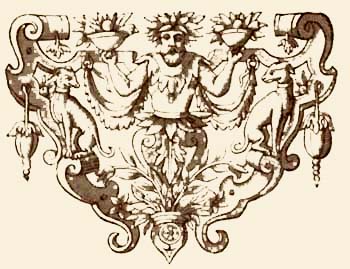
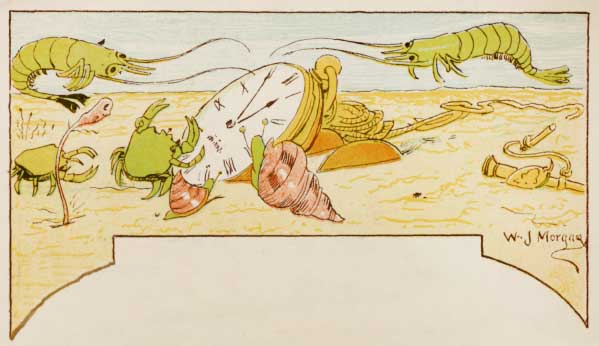
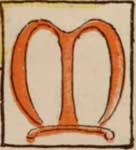
AY we bathe this morning, Mamma?" said the children, putting their heads in at the door of the drawing-room.
Mamma glanced at the time-piece.
"It is rather late," she said doubtfully. "You would have to be very quick. Which of the big ones are going with you?"
"None of them," answered Joan, the smallest of the small party. "They've all gone for a walk except Lilly, and she's drawing in the garden, but I'm sure she'd come if we asked her. Lilly's always so kind—if only you'd say we might."
"It is so fine and sunny, and the tide won't suit again for ever so many days," added two or three imploring voices.
"Very well, then if Lilly will go you may bathe, but you must be quick. I can't have luncheon kept waiting again," said Mamma.
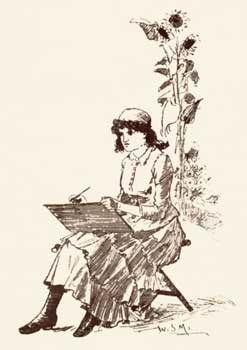
In another moment loud eager cries from the garden reached her[Pg 82] through the open window. "Lilly, Lilly, where are you? Mamma says if you will come—" and then the voices faded away in the distance.
"Poor Lilly," thought Mamma, with a smile. "I wonder if it's a shame of me to let those wild children torment her. I dare say she was counting on a quiet morning."
But whether Lilly was disappointed or not, no sign of anything but content and pleasure appeared on her pretty, bright face when the little group of bathers, all brushed up and tidy again, took their places round the luncheon-table.
"That's right," said Mamma. "You really have been very expeditious this morning. Whom am I to praise?"
She knew before it came what the answer would be.
"Oh, Lilly. Lilly, of course," said Joan, always ready to be spokeswoman. "Lilly made us promise to do exactly as she told us before we went."
"She timed us," said Bill.
"Yes," Joan went on, "wasn't it a good plan? Lilly put her watch on a rock and gave us five minutes to undress in, and a quarter of an hour[Pg 83] to stay in the sea, and ten minutes to dress in. Bill and Humphrey were in the gentlemen's dressing-room, of course—that's what we call the other little bay—and Lilly had to roar out to them, 'one minute more only,'—'two minutes more,' just like a railway man at a station. It was such fun, and—"
"My dear Joan, you will never eat your dinner if you chatter so," said her mother, "and we can't wait for you. I am going a long drive this afternoon, and I shall only just have time," and Mamma looked at her watch. "I hope I am a little fast," she added. "What time do you make it, Lilly dear? Your watch is always to be relied on."
Lilly's hand instinctively went to her watch-pocket—then she suddenly looked up with a rather startled expression.
"My watch!" she exclaimed. "I must have left it up stairs. Mamma—might I run up for a moment and see, if you don't mind?"
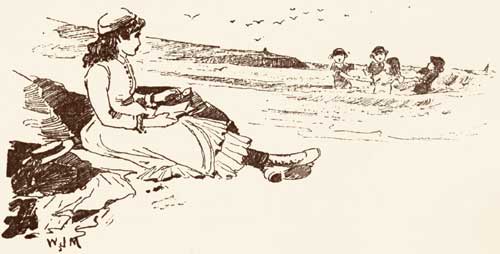
Mamma nodded. She knew that Lilly's watch was one of the girl's most prized treasures. It was a handsome, though rather bulky one,[Pg 84] which had been left to her by her godmother, and Lilly cared for it both because she had loved her godmother, and also for its own sake. It kept excellent time, and never got out of order as the little fairy-like watches that are now the fashion are rather apt to do.
Lilly's moment extended to several minutes without her coming back, and the faces round the table grew rather concerned-looking.
"May I—" Joan was beginning, but just as she spoke Lilly appeared. She was pale, and almost seemed as if she had difficulty in keeping back her tears.
"Mamma," she said, "I can't forgive myself, I am dreadfully afraid my dear watch is gone. I must have left it on the shore."
Up started Bill and Humphrey.
"You'll let us go, Mamma. We don't care about any more dinner. We know where Lilly left it—no one's likely to have been there."
"And the people about here are so honest," said Joan.
"But," said Mamma, "was the stone where you laid it, Lilly, out of reach of the tide? It was almost low tide when you bathed."
All looked startled at this, but the boys persisted.
"All the more reason to go at once," they said, and off they set.
Lilly would fain have gone too, but she gave in to her Mother, and sat quietly, trying to eat, though I fear her luncheon was flavoured by some drops of salt water.
And in a few minutes the whole party started down the road to meet the boys and hear the news.
Alas! as soon as Bill and Humphrey appeared, even in the distance, all hopes were gone. Both boys shook their heads sadly.
"You saw nothing of it?" asked their Mother eagerly. Poor Lilly was past speaking.[Pg 85]
"Nothing—as well as we could make out, the tide must have covered the stones where the girls dressed, some time ago," they replied.
"Then I fear there is nothing to be done," said Mamma. "Poor Lilly, I am so sorry for you."
"And to think it was all my own carelessness," sobbed Lilly. "My dear watch and chain—there was the chain too, Mamma."
But Lilly was so seldom careless, and even if she had been so for once, it was in the service of others, that no one would let her blame herself, and all the family joined to try to console her.
"There is one chance," said Bill to Humphrey, when they were alone,—their Mother and elder sisters having gone out for the afternoon,—"the watch is heavy, and the sea is calm. It may be left there when the tide goes back. Let's see—it will be high tide by about five, and low again by eleven. Those stones should be uncovered by ten o'clock, and it is bright moonlight just now. I tell you what, Humphrey, we'll get Mamma's leave to sit up later to-night, and we'll go off to the shore and have another try for the watch and chain."
Humphrey's eyes sparkled with sympathy.
"We'll say nothing to Lilly—it would be cruel to raise her hopes again on such a chance," he said. "We'll only tell Mamma."
The plan was carried out. At ten o'clock that evening, just as poor Lilly was going to bed, and thinking sadly how strange it seemed to have no watch to wind up, two small figures might have been seen in the moonlight, carefully picking their way among the stones over which the little waves were still softly lapping, for the special group of small rocks they were in search of was not yet uncovered.
It was more difficult than they had expected to find the exact spot. The moonlight and the sheen it cast on the water were rather dazzling. The boys crept along slowly and carefully.[Pg 86]
"I say, what a beautiful night it is," said Bill. "It's a good thing the watch is a gold one; if it were silver there wouldn't be much chance of seeing it—everything looks silver, and—"
But Humphrey interrupted him.
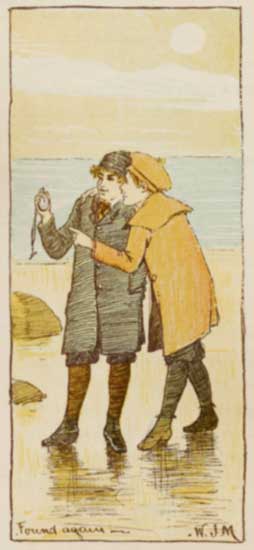
"This is the place—I'm sure it is—look, the smooth sand just beyond is where the girls jumped in, and—"[Pg 87]
In his turn he was interrupted.
"You're right," cried Bill, "and—I do believe—no, there's a little wave hiding it again—now, look, Humphrey—isn't there something glittering still more than the wet stones, down there—on that smooth flat rock?"
Yes—another wave or two came gently lapping in, as if to say good-bye to the treasure they had been playing with, and then the boys stepped forward over the slippery stones, and Bill stooped down and quickly stood up again, with a shout of triumph, for the rescued prize was in his hands.
"And it really doesn't seem much the worse," said he and Humphrey to each other, as they made their way home.
Lilly was not in her first sleep—she was too unhappy to fall asleep as quietly as usual—when a tap at the door made her jump up. There stood her brothers, and behind them Mamma, smiling with pleasure, and for a minute or two Lilly's delight almost stupefied her. She could scarcely believe it was her own dear watch that Bill held out, and when she did believe it, she could not kiss and thank him and Humphrey enough.
The watch had to go to a watch-doctor, of course, and it cost several shillings to put it right, but that is now many years ago, and it still keeps time as well as ever.
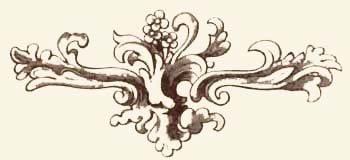


ORA and Hilary were staying in the country with their cousins. It was a new part of the world to them, for their own home, though not actually in a town, was not far from one, and therefore far less rich in wild flowers and mushrooms and blackberries, and all such delightful things than the real country place where these fortunate cousins lived.
Had it not been for the newness and the freedom of it all, they might have found it a little dull, for there was only one child in the family at all near their ages—Nora was eight and Hilary six—and this was a boy of seven called Cecil. Cecil was very much younger than his brothers and sisters, and seemed even younger than his age, for he was small and delicate, and very quiet. Hilary, a great big strong fellow, seemed much older; indeed if you had seen the two together you would certainly have guessed that Cecil and not his cousin was the, so to say, town-bred boy. Cecil had never been so happy in his life as since the[Pg 89] two little visitors had come to stay with him. They seemed to find out all sorts of new things that had never struck him before; pleasures and interests springing all about and close at hand which he had never thought of.
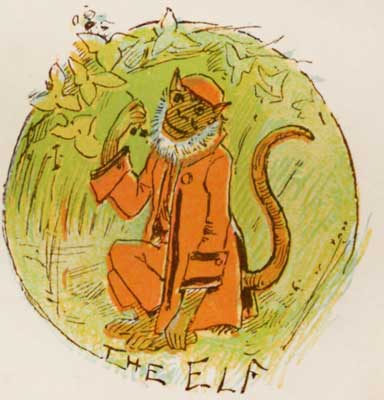
They found everything delightful; as the summer gradually faded into autumn, and the bright flowers grew scarcer and less tempting to gather, the wild fruit in its turn began to ripen. Day by day the children watched the blackberries with the greatest eagerness, as the small red heads steadily got rounder and deeper in colour, till at last one day some of the big people said in the children's hearing, "a couple of days' sunshine and the blackberries will be at their prime; there's a splendid show of them this year."
Nora and Hilary could scarcely keep from jumping with joy, and they made Cecil nearly as eager as themselves. The sun seemed to enter into their feelings, for the very next morning he showed a more smiling face than for some time past, and continued in this amiable humour for several days, so that the children were able on the third day to set off, armed with baskets nearly as big as themselves, for a regular good blackberrying.

All went well for some time. They had been told where and how far they might go, and though it took rather longer than they had expected, to fill even one of the baskets, they worked[Pg 90] on cheerfully, nowise disheartened, chattering to each other from time to time, when a strange thing happened.
Nora was just saying that the only thing she was ever afraid of in the woods was "snakes," and Cecil was assuring her that he was quite certain there were none in "our woods," when he was startled by her giving a little scream.
"What's the matter?" he called out, half thinking that a snake had appeared after all.
"Hush, Cecil, oh, hush!" said Nora in a low and startled voice; "come here, and you, Hilary, come close here, but don't make any noise."
Wondering, and a little frightened, the two boys crept through the bushes to her side.
"What is it, Nora?" they both whispered in an awestruck tone.
"I don't know," she replied. "Cecil, do you know of anything queer in these woods? Are there any dwarfs or—or creatures like in fairy stories? For I am sure I saw a very, very little black or dark-brown man with a red jacket and cap—he wasn't as high as up to my waist—scrambling among the bushes over there, and picking and eating blackberries."[Pg 91]
Cecil and Hilary stared at her.
"You must have fancied it, Nora," said Cecil. "I never heard of a—" but he was interrupted by a sort of smothered scream.
"There, there," whispered Nora, clutching hold of both the boys, "there he is again!"
And sure enough there "he" was, and just exactly as Nora had described him. A tiny dark-brown creature, like a wee old man, with a little red jacket, and a small red skull-cap on the top of his head. He seemed to have come up suddenly from among the bushes; he was holding the branch of a blackberry tree in one hand, and with the other greedily plucking and eating the fruit as fast as he could.
"Who can he be?" said Nora, who had grown very pale.
"I wish I'd a gun here," said Hilary, who was rather given to boasting.
"Nonsense," said Nora, "if he's some kind of a man,—and he can't be an animal—animals don't wear jackets and caps—it would be very wrong, and if he's a—a wood-spirit, or anything like that, shooting would be no good."
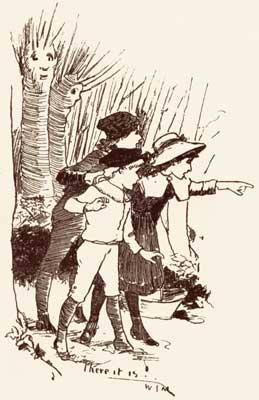
But Hilary and she had raised their voices in this discussion without knowing it. Suddenly the small man turned round, placed one hand behind his big black ear, as if listening, and then, seemingly catching sight of the children, sprang forward, stretching out his two long arms before him in a curious way towards the little group.
A group no longer—with a scream, or three screams joined into one, the children had turned and fled. How they got through the thick growing bushes without being torn to pieces I am sure I cannot tell. Fear lends wings, I suppose. However that may be, I know it was in a wonderfully short time that they found themselves, panting and shaking, breathless and trembling, but safe, inside the shelter of their own garden gate.[Pg 92]
"Oh, Nora!"
"Oh, Cecil!"
"Oh, Hilary!"
"I never was so frightened in my life," each exclaimed in turn.
"If we hadn't all seen it, we might think it was fancy," said Nora.
"I'm afraid the big ones will say it's fancy as it is," said Cecil, "and they will so laugh at us."
"Then we won't tell them," said Nora, "at least we'll wait a little and see. But I daren't go into the woods again; I really daren't."
"Not without a gun," said Hilary.
"Rubbish," said Nora.
They kept their own counsel all that day, though strongly tempted to confide in one or other of the big ones. But after dinner that evening, when they went into dessert, Cecil's father called them to him.
"I've got a story which will amuse you, children," he said. "I was riding past Welby's farm this morning, and Welby was quite full of a present his sailor son has sent him. It is a monkey—the funniest little fellow possible. He arrived, dressed in a red jacket and cap, and was soon as friendly as possible with them all, he says. But the queerest thing is this. Last week Tom Welby took the monkey a walk in the woods and gave him some blackberries. Mr. Monkey seemed to like them very much, and the next morning be disappeared, to the Welbys' consternation. They were sure he was stolen or lost. But late in the afternoon he came home again in a very good humour. And the next morning off he went again, to come home just like the day before. They couldn't make it out, but Tom was determined to find out, so he watched Mr. Monkey, and where do you think he was? In the woods gathering blackberrries on his own account, 'like a Christian,' said old Welby, and enjoying himself thoroughly. And now he goes off every morning regularly, and[Pg 93] comes home when the afternoon gets chilly. It's really most amusing, isn't it?"
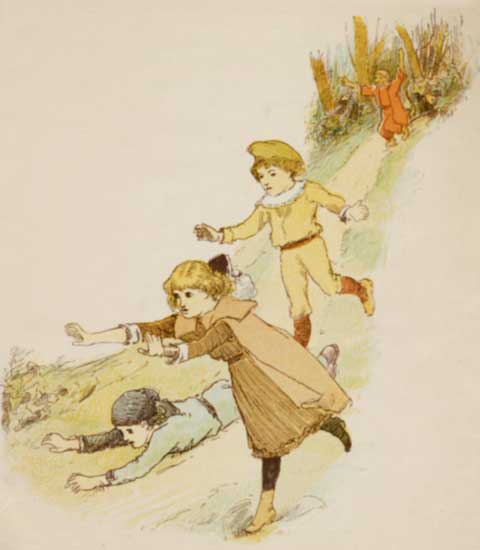
The children looked at each other, but for a moment none of them spoke. Then at last Nora burst out.
"Uncle, we saw him this morning. But—we were very silly—"
"We thought he was a wood-spirit—a—a—I can't remember the name," said Cecil.
"I wanted to shoot him," said Hilary.[Pg 94]
At this there was a shout of laughter all round the table. The children hesitated, then they looked at each other again, and burst out laughing too.
"Why didn't you tell us?" asked big sister Mabel.
"We thought you'd laugh at us," they said.
"And after all we have laughed at you, but I don't think you're any the worse," said Mabel smiling, as she kissed their little flushed faces.
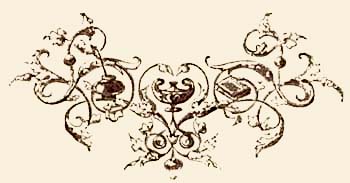
RICHARD CLAY AND SONS, LIMITED, LONDON AND BUNGAY.
A CHARGE FULFILLED. With Three Page Woodcuts
Crown 8vo. Cloth boards, 2s. 6d.
LETTICE. With Three Page Woodcuts. Crown 8vo. Cloth
boards, 2s.
THE ABBEY BY THE SEA, and another Story. With
One Page Woodcut. Post 8vo. Ornamental paper boards, 1s.
THE LITTLE OLD PORTRAIT. With several Illustrations
printed in colours. Post 8vo. Cloth boards, 1s. 6d.
Yearly Volume, containing 12 Numbers, paper boards, 2s.; cloth boards, 2s. 6d.
This Magazine is intended for children of the ages between four and eight years; but it will be found interesting, it is hoped, to those beyond that age. The matter is made as interesting and edifying as possible, and the coloured illustrations are artistic and attractive.
The services of the best known writers for Children have been enlisted for this Magazine, as the names of the chief contributors will show, viz., Mrs. MOLESWORTH, Mrs. MACQUOID, Mrs. SITWELL, Rev. J. G WOOD, Mr. F. S. POTTER, &c.
The Illustrations are furnished by W. J. MORGAN, Esq., HARRISON WEIR, Esq., and other known artists.
SNAPDRAGONS; a Tale of Christmas Eve; and OLD FATHER CHRISTMAS
With Illustrations by Gordon Browne. Small 4to, paper boards, 1s.
THE PEACE EGG, AND A CHRISTMAS MUMMING PLAY. With
Illustrations by Gordon Browne. Small 4to, paper boards, 1s.
MARY'S MEADOW, and Letters from a Little Garden. Illustrated by
Gordon Browne. Small 4to, paper boards, 1s.
LOB LIE-BY-THE-FIRE; or, The Luck of Lingborough. With Illustrations
by the late R. Caldecott. Small 4to, paper boards, 1s.
POEMS FOR CHILD LIFE AND COUNTRY LIFE. Six Books printed in
Colours from Designs by R. Andre. Paper boards, each 1s.
STORY OF A SHORT LIFE (THE). With Illustrations by Gordon Browne
Small 4to, paper boards, 1s.
DADDY DARWIN'S DOVECOT: a Country Tale. With numerous Illustrations
by the late R. Caldecott. Small 4to, paper boards, 1s.
DANDELION CLOCKS and other Tales. With Illustrations by Gordon
Browne, and other artists. Small 4to, paper boards, 1s.
JACKANAPES. With Seventeen Illustrations by the late Randolph Caldecott
Small 4to, paper boards, 1s.
BROTHERS OF PITY, and other Tales of Beasts and Men. Crown 8vo,
with numerous Illustrations, cloth boards, 2s. 6d.
OLD-FASHIONED FAIRY TALES. Foolscap 4to, with numerous Woodcuts,
ornamental paper boards, 3s. 6d.
VERSE BOOKS FOR CHILDREN. Printed in Colours from Designs by R
Andre. Small 4to, ornamental paper boards, each 1s.
Coloured Illustrations by Andre.
A SOLDIER'S CHILDREN, and Five other Tales. Sm. 4to, paper boards, 3s.
BLUE BELLS ON THE LEA, and Ten other Tales. Sm. 4to, paper boards, 3s.
MOTHER'S BIRTHDAY REVIEW, and Seven other Tales. Small 4to
paper boards, 3s.
JULIANA HORATIA EWING AND HER BOOKS. By Horatia K. F. Gatty. With a Portrait by George Reid, R.S.A. Illustrated by facsimiles from Mrs Ewing's sketches, and a cover designed by the late Randolph Caldecott. Small 4to, paper boards, 1s.
Society for Promoting Christian Knowledge
LONDON: Northumberland Avenue, W.C.; 43 Queen Victoria Street, E.C
BRIGHTON: 135 North Street
End of the Project Gutenberg EBook of Five Minutes' Stories, by
Mrs. (Mary Louisa) Molesworth
*** END OF THIS PROJECT GUTENBERG EBOOK FIVE MINUTES' STORIES ***
***** This file should be named 33196-h.htm or 33196-h.zip *****
This and all associated files of various formats will be found in:
http://www.gutenberg.org/3/3/1/9/33196/
Produced by Delphine Lettau, Clive Pickton and the Online
Distributed Proofreading Canada Team at
http://www.pgdpcanada.net
Updated editions will replace the previous one--the old editions
will be renamed.
Creating the works from public domain print editions means that no
one owns a United States copyright in these works, so the Foundation
(and you!) can copy and distribute it in the United States without
permission and without paying copyright royalties. Special rules,
set forth in the General Terms of Use part of this license, apply to
copying and distributing Project Gutenberg-tm electronic works to
protect the PROJECT GUTENBERG-tm concept and trademark. Project
Gutenberg is a registered trademark, and may not be used if you
charge for the eBooks, unless you receive specific permission. If you
do not charge anything for copies of this eBook, complying with the
rules is very easy. You may use this eBook for nearly any purpose
such as creation of derivative works, reports, performances and
research. They may be modified and printed and given away--you may do
practically ANYTHING with public domain eBooks. Redistribution is
subject to the trademark license, especially commercial
redistribution.
*** START: FULL LICENSE ***
THE FULL PROJECT GUTENBERG LICENSE
PLEASE READ THIS BEFORE YOU DISTRIBUTE OR USE THIS WORK
To protect the Project Gutenberg-tm mission of promoting the free
distribution of electronic works, by using or distributing this work
(or any other work associated in any way with the phrase "Project
Gutenberg"), you agree to comply with all the terms of the Full Project
Gutenberg-tm License (available with this file or online at
http://gutenberg.org/license).
Section 1. General Terms of Use and Redistributing Project Gutenberg-tm
electronic works
1.A. By reading or using any part of this Project Gutenberg-tm
electronic work, you indicate that you have read, understand, agree to
and accept all the terms of this license and intellectual property
(trademark/copyright) agreement. If you do not agree to abide by all
the terms of this agreement, you must cease using and return or destroy
all copies of Project Gutenberg-tm electronic works in your possession.
If you paid a fee for obtaining a copy of or access to a Project
Gutenberg-tm electronic work and you do not agree to be bound by the
terms of this agreement, you may obtain a refund from the person or
entity to whom you paid the fee as set forth in paragraph 1.E.8.
1.B. "Project Gutenberg" is a registered trademark. It may only be
used on or associated in any way with an electronic work by people who
agree to be bound by the terms of this agreement. There are a few
things that you can do with most Project Gutenberg-tm electronic works
even without complying with the full terms of this agreement. See
paragraph 1.C below. There are a lot of things you can do with Project
Gutenberg-tm electronic works if you follow the terms of this agreement
and help preserve free future access to Project Gutenberg-tm electronic
works. See paragraph 1.E below.
1.C. The Project Gutenberg Literary Archive Foundation ("the Foundation"
or PGLAF), owns a compilation copyright in the collection of Project
Gutenberg-tm electronic works. Nearly all the individual works in the
collection are in the public domain in the United States. If an
individual work is in the public domain in the United States and you are
located in the United States, we do not claim a right to prevent you from
copying, distributing, performing, displaying or creating derivative
works based on the work as long as all references to Project Gutenberg
are removed. Of course, we hope that you will support the Project
Gutenberg-tm mission of promoting free access to electronic works by
freely sharing Project Gutenberg-tm works in compliance with the terms of
this agreement for keeping the Project Gutenberg-tm name associated with
the work. You can easily comply with the terms of this agreement by
keeping this work in the same format with its attached full Project
Gutenberg-tm License when you share it without charge with others.
1.D. The copyright laws of the place where you are located also govern
what you can do with this work. Copyright laws in most countries are in
a constant state of change. If you are outside the United States, check
the laws of your country in addition to the terms of this agreement
before downloading, copying, displaying, performing, distributing or
creating derivative works based on this work or any other Project
Gutenberg-tm work. The Foundation makes no representations concerning
the copyright status of any work in any country outside the United
States.
1.E. Unless you have removed all references to Project Gutenberg:
1.E.1. The following sentence, with active links to, or other immediate
access to, the full Project Gutenberg-tm License must appear prominently
whenever any copy of a Project Gutenberg-tm work (any work on which the
phrase "Project Gutenberg" appears, or with which the phrase "Project
Gutenberg" is associated) is accessed, displayed, performed, viewed,
copied or distributed:
This eBook is for the use of anyone anywhere at no cost and with
almost no restrictions whatsoever. You may copy it, give it away or
re-use it under the terms of the Project Gutenberg License included
with this eBook or online at www.gutenberg.org
1.E.2. If an individual Project Gutenberg-tm electronic work is derived
from the public domain (does not contain a notice indicating that it is
posted with permission of the copyright holder), the work can be copied
and distributed to anyone in the United States without paying any fees
or charges. If you are redistributing or providing access to a work
with the phrase "Project Gutenberg" associated with or appearing on the
work, you must comply either with the requirements of paragraphs 1.E.1
through 1.E.7 or obtain permission for the use of the work and the
Project Gutenberg-tm trademark as set forth in paragraphs 1.E.8 or
1.E.9.
1.E.3. If an individual Project Gutenberg-tm electronic work is posted
with the permission of the copyright holder, your use and distribution
must comply with both paragraphs 1.E.1 through 1.E.7 and any additional
terms imposed by the copyright holder. Additional terms will be linked
to the Project Gutenberg-tm License for all works posted with the
permission of the copyright holder found at the beginning of this work.
1.E.4. Do not unlink or detach or remove the full Project Gutenberg-tm
License terms from this work, or any files containing a part of this
work or any other work associated with Project Gutenberg-tm.
1.E.5. Do not copy, display, perform, distribute or redistribute this
electronic work, or any part of this electronic work, without
prominently displaying the sentence set forth in paragraph 1.E.1 with
active links or immediate access to the full terms of the Project
Gutenberg-tm License.
1.E.6. You may convert to and distribute this work in any binary,
compressed, marked up, nonproprietary or proprietary form, including any
word processing or hypertext form. However, if you provide access to or
distribute copies of a Project Gutenberg-tm work in a format other than
"Plain Vanilla ASCII" or other format used in the official version
posted on the official Project Gutenberg-tm web site (www.gutenberg.org),
you must, at no additional cost, fee or expense to the user, provide a
copy, a means of exporting a copy, or a means of obtaining a copy upon
request, of the work in its original "Plain Vanilla ASCII" or other
form. Any alternate format must include the full Project Gutenberg-tm
License as specified in paragraph 1.E.1.
1.E.7. Do not charge a fee for access to, viewing, displaying,
performing, copying or distributing any Project Gutenberg-tm works
unless you comply with paragraph 1.E.8 or 1.E.9.
1.E.8. You may charge a reasonable fee for copies of or providing
access to or distributing Project Gutenberg-tm electronic works provided
that
- You pay a royalty fee of 20% of the gross profits you derive from
the use of Project Gutenberg-tm works calculated using the method
you already use to calculate your applicable taxes. The fee is
owed to the owner of the Project Gutenberg-tm trademark, but he
has agreed to donate royalties under this paragraph to the
Project Gutenberg Literary Archive Foundation. Royalty payments
must be paid within 60 days following each date on which you
prepare (or are legally required to prepare) your periodic tax
returns. Royalty payments should be clearly marked as such and
sent to the Project Gutenberg Literary Archive Foundation at the
address specified in Section 4, "Information about donations to
the Project Gutenberg Literary Archive Foundation."
- You provide a full refund of any money paid by a user who notifies
you in writing (or by e-mail) within 30 days of receipt that s/he
does not agree to the terms of the full Project Gutenberg-tm
License. You must require such a user to return or
destroy all copies of the works possessed in a physical medium
and discontinue all use of and all access to other copies of
Project Gutenberg-tm works.
- You provide, in accordance with paragraph 1.F.3, a full refund of any
money paid for a work or a replacement copy, if a defect in the
electronic work is discovered and reported to you within 90 days
of receipt of the work.
- You comply with all other terms of this agreement for free
distribution of Project Gutenberg-tm works.
1.E.9. If you wish to charge a fee or distribute a Project Gutenberg-tm
electronic work or group of works on different terms than are set
forth in this agreement, you must obtain permission in writing from
both the Project Gutenberg Literary Archive Foundation and Michael
Hart, the owner of the Project Gutenberg-tm trademark. Contact the
Foundation as set forth in Section 3 below.
1.F.
1.F.1. Project Gutenberg volunteers and employees expend considerable
effort to identify, do copyright research on, transcribe and proofread
public domain works in creating the Project Gutenberg-tm
collection. Despite these efforts, Project Gutenberg-tm electronic
works, and the medium on which they may be stored, may contain
"Defects," such as, but not limited to, incomplete, inaccurate or
corrupt data, transcription errors, a copyright or other intellectual
property infringement, a defective or damaged disk or other medium, a
computer virus, or computer codes that damage or cannot be read by
your equipment.
1.F.2. LIMITED WARRANTY, DISCLAIMER OF DAMAGES - Except for the "Right
of Replacement or Refund" described in paragraph 1.F.3, the Project
Gutenberg Literary Archive Foundation, the owner of the Project
Gutenberg-tm trademark, and any other party distributing a Project
Gutenberg-tm electronic work under this agreement, disclaim all
liability to you for damages, costs and expenses, including legal
fees. YOU AGREE THAT YOU HAVE NO REMEDIES FOR NEGLIGENCE, STRICT
LIABILITY, BREACH OF WARRANTY OR BREACH OF CONTRACT EXCEPT THOSE
PROVIDED IN PARAGRAPH F3. YOU AGREE THAT THE FOUNDATION, THE
TRADEMARK OWNER, AND ANY DISTRIBUTOR UNDER THIS AGREEMENT WILL NOT BE
LIABLE TO YOU FOR ACTUAL, DIRECT, INDIRECT, CONSEQUENTIAL, PUNITIVE OR
INCIDENTAL DAMAGES EVEN IF YOU GIVE NOTICE OF THE POSSIBILITY OF SUCH
DAMAGE.
1.F.3. LIMITED RIGHT OF REPLACEMENT OR REFUND - If you discover a
defect in this electronic work within 90 days of receiving it, you can
receive a refund of the money (if any) you paid for it by sending a
written explanation to the person you received the work from. If you
received the work on a physical medium, you must return the medium with
your written explanation. The person or entity that provided you with
the defective work may elect to provide a replacement copy in lieu of a
refund. If you received the work electronically, the person or entity
providing it to you may choose to give you a second opportunity to
receive the work electronically in lieu of a refund. If the second copy
is also defective, you may demand a refund in writing without further
opportunities to fix the problem.
1.F.4. Except for the limited right of replacement or refund set forth
in paragraph 1.F.3, this work is provided to you 'AS-IS' WITH NO OTHER
WARRANTIES OF ANY KIND, EXPRESS OR IMPLIED, INCLUDING BUT NOT LIMITED TO
WARRANTIES OF MERCHANTIBILITY OR FITNESS FOR ANY PURPOSE.
1.F.5. Some states do not allow disclaimers of certain implied
warranties or the exclusion or limitation of certain types of damages.
If any disclaimer or limitation set forth in this agreement violates the
law of the state applicable to this agreement, the agreement shall be
interpreted to make the maximum disclaimer or limitation permitted by
the applicable state law. The invalidity or unenforceability of any
provision of this agreement shall not void the remaining provisions.
1.F.6. INDEMNITY - You agree to indemnify and hold the Foundation, the
trademark owner, any agent or employee of the Foundation, anyone
providing copies of Project Gutenberg-tm electronic works in accordance
with this agreement, and any volunteers associated with the production,
promotion and distribution of Project Gutenberg-tm electronic works,
harmless from all liability, costs and expenses, including legal fees,
that arise directly or indirectly from any of the following which you do
or cause to occur: (a) distribution of this or any Project Gutenberg-tm
work, (b) alteration, modification, or additions or deletions to any
Project Gutenberg-tm work, and (c) any Defect you cause.
Section 2. Information about the Mission of Project Gutenberg-tm
Project Gutenberg-tm is synonymous with the free distribution of
electronic works in formats readable by the widest variety of computers
including obsolete, old, middle-aged and new computers. It exists
because of the efforts of hundreds of volunteers and donations from
people in all walks of life.
Volunteers and financial support to provide volunteers with the
assistance they need, are critical to reaching Project Gutenberg-tm's
goals and ensuring that the Project Gutenberg-tm collection will
remain freely available for generations to come. In 2001, the Project
Gutenberg Literary Archive Foundation was created to provide a secure
and permanent future for Project Gutenberg-tm and future generations.
To learn more about the Project Gutenberg Literary Archive Foundation
and how your efforts and donations can help, see Sections 3 and 4
and the Foundation web page at http://www.pglaf.org.
Section 3. Information about the Project Gutenberg Literary Archive
Foundation
The Project Gutenberg Literary Archive Foundation is a non profit
501(c)(3) educational corporation organized under the laws of the
state of Mississippi and granted tax exempt status by the Internal
Revenue Service. The Foundation's EIN or federal tax identification
number is 64-6221541. Its 501(c)(3) letter is posted at
http://pglaf.org/fundraising. Contributions to the Project Gutenberg
Literary Archive Foundation are tax deductible to the full extent
permitted by U.S. federal laws and your state's laws.
The Foundation's principal office is located at 4557 Melan Dr. S.
Fairbanks, AK, 99712., but its volunteers and employees are scattered
throughout numerous locations. Its business office is located at
809 North 1500 West, Salt Lake City, UT 84116, (801) 596-1887, email
business@pglaf.org. Email contact links and up to date contact
information can be found at the Foundation's web site and official
page at http://pglaf.org
For additional contact information:
Dr. Gregory B. Newby
Chief Executive and Director
gbnewby@pglaf.org
Section 4. Information about Donations to the Project Gutenberg
Literary Archive Foundation
Project Gutenberg-tm depends upon and cannot survive without wide
spread public support and donations to carry out its mission of
increasing the number of public domain and licensed works that can be
freely distributed in machine readable form accessible by the widest
array of equipment including outdated equipment. Many small donations
($1 to $5,000) are particularly important to maintaining tax exempt
status with the IRS.
The Foundation is committed to complying with the laws regulating
charities and charitable donations in all 50 states of the United
States. Compliance requirements are not uniform and it takes a
considerable effort, much paperwork and many fees to meet and keep up
with these requirements. We do not solicit donations in locations
where we have not received written confirmation of compliance. To
SEND DONATIONS or determine the status of compliance for any
particular state visit http://pglaf.org
While we cannot and do not solicit contributions from states where we
have not met the solicitation requirements, we know of no prohibition
against accepting unsolicited donations from donors in such states who
approach us with offers to donate.
International donations are gratefully accepted, but we cannot make
any statements concerning tax treatment of donations received from
outside the United States. U.S. laws alone swamp our small staff.
Please check the Project Gutenberg Web pages for current donation
methods and addresses. Donations are accepted in a number of other
ways including checks, online payments and credit card donations.
To donate, please visit: http://pglaf.org/donate
Section 5. General Information About Project Gutenberg-tm electronic
works.
Professor Michael S. Hart is the originator of the Project Gutenberg-tm
concept of a library of electronic works that could be freely shared
with anyone. For thirty years, he produced and distributed Project
Gutenberg-tm eBooks with only a loose network of volunteer support.
Project Gutenberg-tm eBooks are often created from several printed
editions, all of which are confirmed as Public Domain in the U.S.
unless a copyright notice is included. Thus, we do not necessarily
keep eBooks in compliance with any particular paper edition.
Most people start at our Web site which has the main PG search facility:
http://www.gutenberg.org
This Web site includes information about Project Gutenberg-tm,
including how to make donations to the Project Gutenberg Literary
Archive Foundation, how to help produce our new eBooks, and how to
subscribe to our email newsletter to hear about new eBooks.